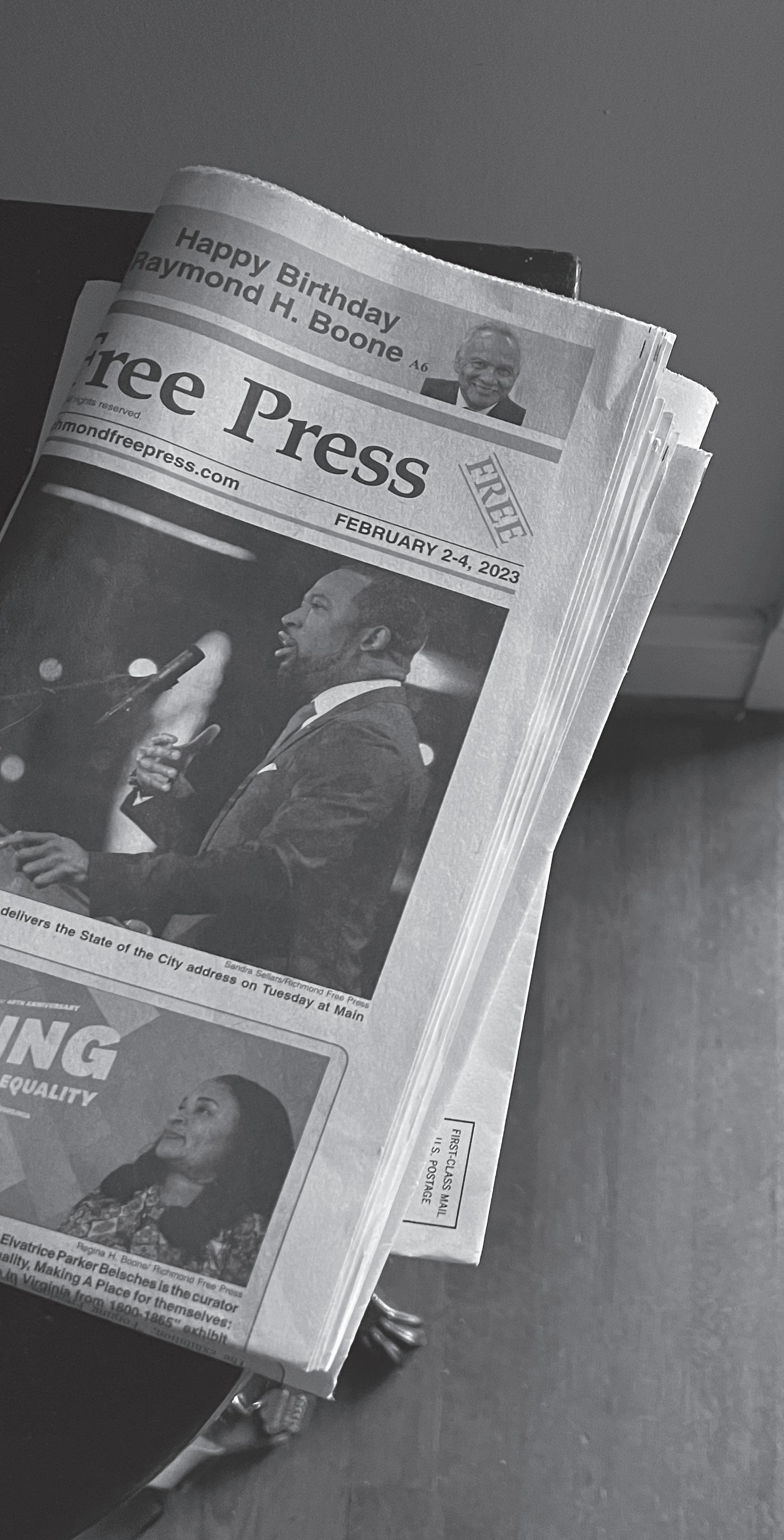










By George Copeland Jr.
More than a dozen new community service projects will begin Saturday, Jan. 11, as part of Mayor Danny Avula’s “Inaugural Day of Service.”
The day will begin at 9 a.m. with a ceremonial swearing-in at Martin Luther King Jr. Middle School, featuring performances by the school’s cheer squad and Richmond poet laureate Joanna Lee. The event is free, but registration is required.
“I’m thrilled to host my ceremonial swearing-in at MLK Middle School,” Avula said in a statement announcing the day’s plans. “Thanks to RPS for allowing us to gather in the neighborhood I’ve called home for two decades.”
After the ceremony, Avula’s Inaugural
By George Copeland Jr.
New Year’s Day brought a range of new laws and changes to Virginia, including a rise in the minimum wage, expanded protections against discrimination, harassment and retaliation based on ethnic origin and greater privacy for minors from data collectors. These are a few of the changes residents can expect this year.
As of Wednesday, Jan. 1, the hourly minimum wage for workers in Virginia increased from $12 to $12.41, thanks to the Virginia Minimum Wage Act. This increase occurs despite Gov. Glenn Youngkin vetoing a bill in 2024 that would have raised the minimum wage to $13.50 by 2025 and $15 per hour by 2026.
Workplace discrimination, harassment and retaliation due to an employee’s ethnic origin
is now prohibited under the newly expanded Virginia Human Rights Act. Employers will have to update their training programs and policies to adhere to this expansion.
Virginia workers looking to ensure financial stability once they retire may have a new option for saving money, thanks to RetirePath Virginia.
Businesses that have been in operation for more than two years and have 25 or more employees must now participate in the program, which began in 2023 and provides retirement savings plans and accounts to help workers save money from paychecks, and follows them through changes in jobs and relocations.
Employers who fail to register with the program could face penalties as high as $200 for each employee, while employees at qualifying businesses
will be automatically enrolled after their employers register, unless they decline within 30 days of enrollment.
Parents in Virginia who are concerned about their kids being targeted online and their data being collected now have a way to control what gets shared and sold. Tech companies and other businesses with online services must get parental consent before using children’s personal data for things such as targeted ads, profiling, or any other purpose that is not clearly explained when the data is collected.
This rule also limits the collection of precise geolocation data from children and requires companies to assess how they handle children’s data for online services, products and features aimed at them. These assessments help companies evaluate
America mourns the loss of Jimmy
Committee and the City of Richmond will host service projects across all nine council districts, with residents encouraged to participate.
The projects include the restoration, maintenance and protection of Libby Hill Park, Maury Cemetery and the Gilpin Community Garden, youth education support such as preparing materials for a SOLfocused field trip program and organizing the Book Bank at the Children’s Museum and other community projects. Organizations including Southside ReLeaf, SOAR365, Celebrate RVA, Friends of Grace Street Park and Little Hands Virginia will contribute to or lead these projects.
“We’ve worked with several different departments and offices at City Hall, with
Richmond Public Schools, City Council, the Community Foundation and with nonprofits and community groups all across the city to put together a really meaningful list of opportunities for folks to serve the community,” said Jonathan Chan, operations director for the Inaugural Committee.
The Day of Service will end with a ticketed celebration from 7:30 to 10 p.m. at the Virginia Museum of Fine Arts hosted by the Inaugural Committee, and will feature food, music from the No BS! Brass Band, VCUArts Music and special guests.
For more information, including registration for the swearing-in and service projects, as well as tickets for the inaugural celebration, visit dannyformayor.com/ inauguration.

Sandra
Janine Bell, founder and artistic director of Elegba Folklore Society, on Dec. 28 pours libation and performs during the 58th Capital City Kwanzaa celebration. The theme for the event was “Knowledge of Self.” More pictures on A4.

By Stacy M. Brown NNPA Newswire
James “Jimmy” Carter, the peanut farmer from Plains, Ga., who became the 39th president of the United States and later redefined the role of an ex-president through decades of humanitarian work, died Sunday, Dec. 29, 2024, at his home. He was 100. His son, James E. Carter III, known as Chip, confirmed the death but provided no immediate cause. Carter had been in hospice care since February 2023 after battling an aggressive form of melanoma that spread to his brain and liver.
Carter’s wife, Rosalynn, with whom he shared 77 years of marriage—the longest of any presidential couple—died on Nov. 19, 2023, at 96. The couple’s final years were marked by their enduring love, and Carter’s last public appearance was at Rosalynn’s funeral, where he sat in the front row in a wheelchair.
Born in Plains on Oct. 1, 1924, Carter grew up on a farm, served in the U.S. Navy, and rose to prominence as Georgia’s governor from 1971 to 1975. He was elected president in 1976, becoming the first from the Deep
South since 1837. The victory made Carter the only Democrat to hold the office between Lyndon B. Johnson and Bill Clinton.
Carter’s presidency, defined by ambitious domestic and foreign policy initiatives, faced formidable challenges. During Carter’s presidency, America struggled with stagflation, an energy crisis, and international turmoil.
The 1979 Iranian hostage crisis and the failed rescue mission that followed, combined with economic woes and a Soviet invasion of Afghanistan, led to his overwhelming defeat in the 1980 election by Ronald Reagan. Despite serving just one term, Carter’s presidency is remembered by historians as one of the most consequential. He brokered the Camp David Accords between Egypt and Israel in 1978, a milestone in Middle East peace efforts. Carter prioritized human rights in U.S. foreign policy, advanced environmental conservation, and created the Departments of Energy and Education. His vision for alternative energy led to installing solar panels on the White House, which he called “a small part of one of the greatest and
By Dean Mirshahi VPM
Five members of the white nationalist group Patriot Front settled a civil lawsuit over defacing the Arthur Ashe mural in Richmond’s Battery Park in October 2021. Details of the settlement are confidential, according to the national civil rights organization that filed the lawsuit for two anonymous neighborhood residents. Their attorneys declined to comment on the deal. The residents alleged Patriot Front targeted the Ashe mural because of its location in a historically Black neighborhood and conspiring to violate their civil rights under a law known as the Ku Klux
Klan Act of 1871, which ensures protections against intimidation and violence. The residents also claimed that defacing the mural was intended to intimidate them and keep them from frequenting the public park, keep their children away from the public space and led them to lose sleep. The lawsuit sought damages, for the court to rule that the vandalism violated their rights and to stop Patriot Front members from future violations.
Attorneys for the defendants — Nathan Noyce, Thomas Dail, Paul Gancarz, Daniel Turetchi and Aedan Tredinnick — did not respond to interview requests. Noyce was arrested and charged in April with a range of federal crimes in
connection to his alleged participation in the Jan. 6, 2021, U.S. Capitol insurrection. He pleaded not guilty to all charges.
In April court filings for the vandalism case, Noyce and Dail admitted to defacing the mural but denied it was part of a coordinated vandalism campaign aimed at murals “honoring Black lives,” as the plaintiffs claimed. Gancarz also acknowledged he was Patriot Front’s regional network director for Virginia, Washington, D.C., Maryland and Delaware at the time of the vandalism. He described it as a “regrettable incident involving the Arthur Ashe mural” that

life
Construction continues at the site where CarMax Park will stand, next to the Flying Squirrels’ current home at The Diamond. The new facility is scheduled to be completed in time for the 2026 season. The ballpark will feature a 360-degree wraparound concourse, a field-level dugout suite and a multitiered beer garden.


By Brodie Greene
Richmond Chief of Fire and Emergency Services Melvin Carter announced his retirement Friday, Dec. 27, after nearly four decades of service to the city. Carter was the third AfricanAmerican chief in the department’s history.
He began his career in 1983 as a volunteer firefighter for the Henrico County Division of Fire before working as a professional firefighter in Petersburg in 1986. A year later, he began working as a firefighter for the City of Richmond where he rose through several ranks including company lieutenant, captain, deputy fire marshal and battalion chief before he was appointed deputy fire chief in 2009. In 2017, former Mayor Levar M. Stoney appointed Carter as the 21st chief of Fire and Emergency Services.
“I am profoundly grateful God provided me the opportunity to serve the city where I was born and raised for the past 37 years,” Carter stated in a press release. “It has been a true blessing to realize my childhood dream in this capacity. I would also like to extend my heartfelt thanks to Mayor Stoney for entrusting me with the leadership of the Richmond Fire Department during his tenure. It has been an honor to serve in this role.” Stoney, who was made aware of the retirement on Friday, recognized Chief Carter for his service. “After nearly 40 years of service and seven years as our fire chief, I want to thank him for his unwavering commitment to the safety of his hometown,” he said. “We are a safer city because of Melvin Carter, and I wish him the best in retirement.”
In 2023 Carter was recognized as Virginia Fire Chief of the Year” by Gov. Glenn Youngkin for his efforts to update equipment and fire stations throughout the city. Additionally, he oversaw the creation of 72 new positions within the department made possible by a $13 million federal grant.
Carter’s retirement took effect Dec. 31. Assistant Fire Chief Jeffrey Segal will serve as interim chief. Before joining Richmond Fire and Emergency Services in 2020, Segal served the Baltimore City Fire Department for over 30 years.
Free community testing for COVID-19 continues
The Richmond and Henrico health districts are set to begin COVID-19 testing in 2025 on Thursday, Jan. 8. New data from the Virginia Department of Health on COVID-19’s impact on emergency department visits, respiratory illness levels, or deaths related to the virus were not available at press time. COVID-19 wastewater levels for Richmond and Henrico County also were unavailable.
RHHD’s Resource Centers are providing free at-home tests for pickup at select locations:
• Creighton Court at 2150 Creighton Road, call 804-3710433.
• Fairfield Court at 2311 N. 25th St., call 804-786-4099.
• Gilpin Court at 436 Calhoun St., call 804-786-1960.
• Hillside Court at 1615 Glenfield Ave., call 804-230-7740.
• Mosby Court at 1536 Coalter St., call 804-786-0204.
• Southwood Court at 1754 Clarkson Road. Unit #B, call 804-230-2077.
• Whitcomb Court at 2106 Deforrest St., call 804-786-0555. For Virginia Department of Health testing locations, visit vdh. virginia.gov. Additional testing site information can be found at vax.rchd.com. Want a COVID-19 vaccine?
Individuals interested in receiving the COVID-19 vaccine can schedule an appointment with the Richmond and Henrico health districts by calling (804) 205-3501. Additionally, vaccines.gov provides a list of pharmacies and clinics offering the vaccine. You also can find locations by texting your ZIP code to 438829 or calling 1-800-232-0233.
The Centers for Disease Control and Prevention also offers a vaccine locator at vaccines.gov. Residents also can order four free at-home COVID test kits at covidtest.gov, while supplies last.
The CDC recommends the COVID-19 vaccine for everyone age 6 months and older. Pfizer-BioNTech and Moderna vaccines are approved for everyone age 6 months and up, while Novavax is for those age 12 and older. Vaccines are available at pharmacies and health care providers. Compiled by George Copeland Jr.

Virginia Humanities is now accepting applications for the Historically Black Colleges and Universities Scholars Fellowship, a program designed to support humanities scholars affiliated with HBCUs. The fellowship works to bridge the resource gap for these scholars, amplify underrepresented voices, and encourage research into the heritage of Indigenous, Afro-Descendant, and Traditional Peoples.
Since its launch in 2021, the fellowship has funded nine scholars across three cohorts, resulting in book contracts with leading academic presses, the publication of peer-reviewed articles, entries in “Encyclopedia Virginia” and notable awards such as the Fulbright-Hays Group Projects
Abroad grant. Fellows also have secured career advancements, including tenuretrack positions and successful dissertation defenses.
Participants in the program gain access to the University of Virginia’s library resources, connect with academic publishing outlets and present their work through public platforms such as Virginia Humanities’ “With Good Reason” radio show. They also receive professional development workshops and mentorship opportunities.
For the first time, Virginia Humanities is offering both short-term (three to six months) and long-term (nine to 12 months) fellowship options. This dual path is intended to make the program more accessible, particularly for those who may not be able to commit to a full academic
year. Short-term fellowships range from $5,000 to $15,000, while long-term fellowships offer awards between $20,000 and $45,000.
The fellowship is open to humanities scholars affiliated with accredited HBCUs, including alumni, current faculty and doctoral candidates. Projects exploring Virginia’s historical significance, activism in Black historic preservation, and broader South Atlantic themes are encouraged. The fellowship aims to produce scholarly contributions or public humanities work that engages large audiences. Applications are due by Sunday, March 2. Interested applicants can visit Virginia Humanities’ HBCU Fellowships page for more information and to submit their applications.
Free Press staff report
The Adinkra Alliance Institute recently announced the 2024 recipients of the Adinkra Distinguished Black Achievers Honors, recognizing Black leaders around the country whose significant contributions have positively impacted their communities.
The recipients, celebrated for their leadership, service and community empowerment, have made notable strides in fields such as education, activism, business and public service. Their dedication continues to inspire progress and embody the resilience, innovation and excellence that define the Black community.
“The honorees from Virginia exemplify

the highest standards of leadership and service. They inspire us all through their relentless commitment to bettering their communities and advancing the cause of Black excellence,” said Richard Seshie, president of the Adinkra Alliance Institute. “It is our great privilege to honor and celebrate their remarkable achievements.”
The 2024 Adinkra Distinguished Black Achievers honorees from Virginia include Angela D. Reddix, president and CEO of
Ardx,; Deborah Bell Young, health, safety, environmental leader at Honeywell Specialty Materials; Gilbert T. Bland, president and CEO of the Urban League of Hampton Roads; Makola Abdullah, 14th president of Virginia State University; Moses Foster, president and CEO of West Cary Group; Rodney Williams, CEO and co-founder of Lisnr; Shawn Purvis, president of Northrop Grumman Enterprise Services; Tynisha D. Willingham, provost at Eastern Mennonite University; Tyrone Noel, Hampton Roads president of Bank of America; and Warren Thompson, president and chairman of Thompson Hospitality.
For more information, visit adinkrainstitute.com.
Youngkin putting brakes on car tax burden with new budget amendment
By Nathaniel Cline
As lawmakers consider Gov. Glenn Youngkin’s proposal to provide vehicle tax relief for Virginians and ultimately eliminate the property tax, policymakers can find comfort after repeals in Rhode Island and Georgia.
All of Virginia’s cities, counties and towns are subject to a personal property tax, which helps fund their respective governments. Municipalities are likely to be impacted by such a relief or repeal proposal, including some, like Chesapeake, that have been grappling with reforming vehicle-related taxes.
On Dec. 18, Youngkin said a family of four in Virginia pays about $290 on their vehicle taxes annually during his address to lawmakers and cabinet members.
“Let’s give Virginia families relief on the most hated tax in America since the tax on tea — the local car tax,” Youngkin said.
While the governor did not include a plan to repeal the tax when he first raised the idea last December, this year he proposed an amendment to the current biennium budget to allocate $1.1 billion into a car tax credit fund to provide income tax rebates to nearly 1.9 billion taxpayers earning up to $50,000 in adjusted gross income for individuals or $100,000 for couples filing jointly.
Eligible taxpayers would receive up to $150 for individual returns or $300 for joint returns annually for the next three years. After the fund is exhausted, the state would see a permanent reduction of $360 million in tax revenues each year.
If successful, Virginia would join several states and jurisdictions that do
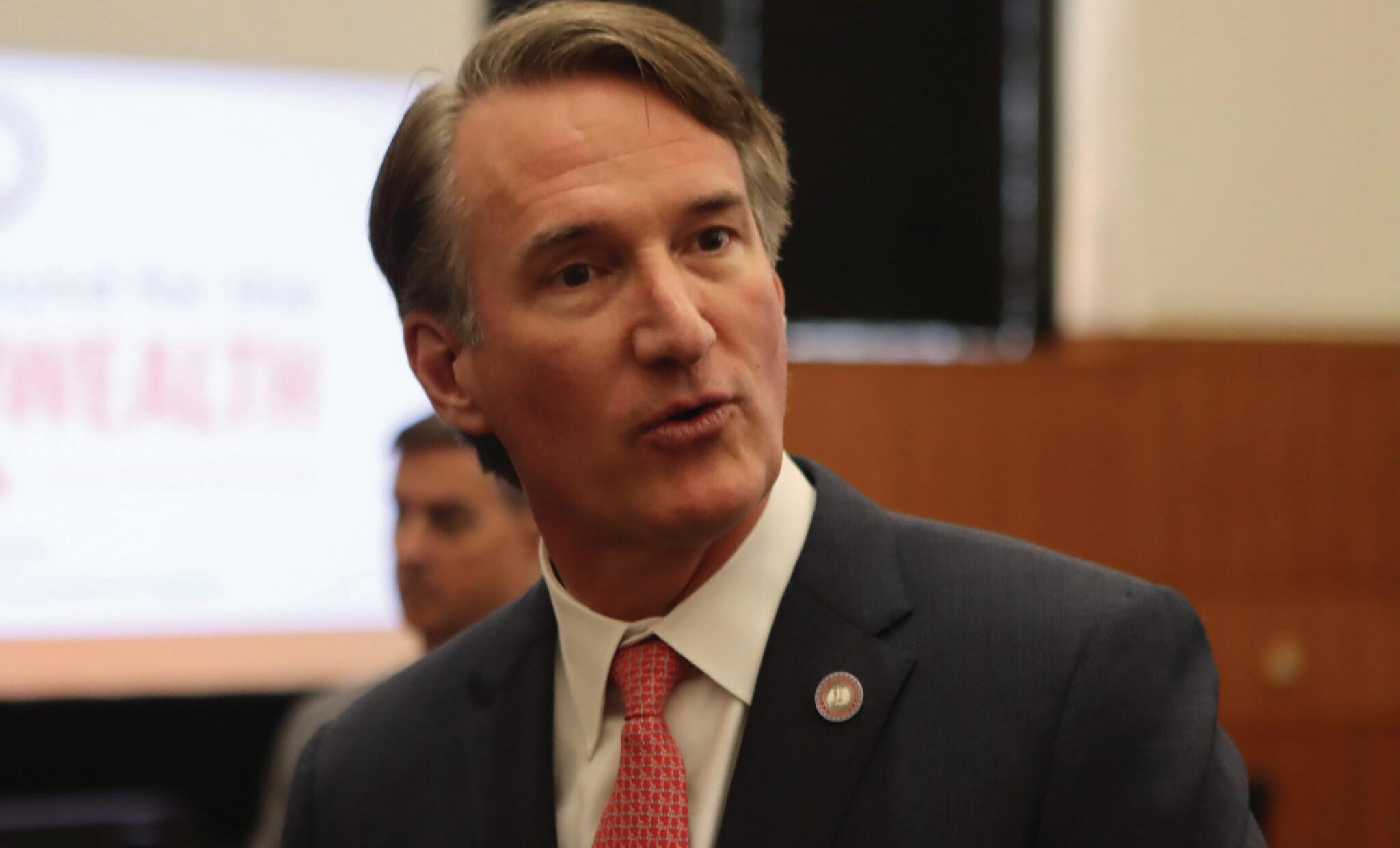
not impose a vehicle tax, including the District of Columbia, Georgia, Maryland and Rhode Island. According to a Nov. 7, 2023, legislative report completed in Connecticut, which was studying tax repeals, Rhode Island and Georgia over the past seven years repealed their vehicle property tax either by adjusting tax calculation factors by an increasing amount over a number of years, or enacting it only for taxpayers that perform a triggering action, such as applying for a vehicle title. Georgia and Rhode Island took different approaches to address local governments’ revenue losses. Rhode Island reimbursed revenue losses from general appropriations and adjusted reimbursements based on sales tax revenues. Georgia replaced its state and local
annual property and sales taxes with a one-time per owner tax, divided between the state and municipalities. Last year, West Virginia created a fully refundable tax credit to eliminate the tax’s impact on residents while holding municipalities harmless, which took effect in 2024.
In 1998, Virginia developed a vehicle tax relief program, but the reimbursement rate starting at 12.5% was frozen at 70% in 2021, below the anticipated 100%, due to unforeseen costs as new car values increased substantially faster than inflation.
Virginia lawmakers will start their 45day session discussing proposed bills and budget amendments Jan. 8. This story originally appeared on VirginiaMercury.com
By Anick Jesdanun and Michael R. Sisak
The Associated Press
Richard Parsons, one of corporate America’s most prominent Black executives who held top posts at Time Warner and Citigroup, died Thursday, Dec. 26, 2024. He was 76.
Parsons, who died at his Manhattan home, was diagnosed with multiple myeloma in 2015 and cited “unanticipated complications” from the disease for cutting back on work a few years later.
The financial services company Lazard, where Parsons was a longtime board member, confirmed his death.
Parsons’ friend Ronald Lauder told The New York Times that the cause of death was cancer.
Parsons stepped down Dec. 3 from the boards of Lazard and Lauder’s company, Estée Lauder, citing health reasons. He had been on Estée Lauder’s board for 25 years.
“Dick was an American original, a colossus bestriding the worlds of business, media, culture, philanthropy and beyond,” Ronald Lauder said in a statement on behalf of the Lauder family.
David Zaslav, the CEO of Time Warner successor Warner Bros. Discovery, hailed Parsons as a “great mentor and friend” and a “tough and brilliant negotiator, always looking to create something where both sides win.”
“All who got a chance to work with him and know him saw that unusual combination of great leadership with integrity and kindness,” Zaslav said, calling him “one of the great problem solvers this industry has ever seen.”
Parsons, a Brooklyn native who started college at 16, built a track record of steering big companies through tough times.
He returned Citigroup to profitability after turmoil from the global financial crisis and helped restore Time Warner after its much-maligned acquisition by internet provider America Online.
Parsons was named to the board of CBS in September 2018 but resigned a month later because of illness.
Parsons said in a statement at the time that
he was already dealing with multiple myeloma when he joined the board, but “unanticipated complications have created additional new challenges.” He said his doctors advised him to cut back on his commitments to ensure recovery.
“Dick’s storied career embodied the finest traditions of American business leadership,” Lazard said in a statement. The company, where Parsons was a board member from 2012 until this month, praised his “unmistakable intelligence and his irresistible warmth.”
“Dick was more than an iconic leader in Lazard’s history — he was a testament to how wisdom, warmth and unwavering judgment could shape not just companies, but people’s lives,” the company stated. “His legacy lives on in the countless leaders he counseled, the institutions he renewed, and the doors he opened for others.”
Parsons was known as a skilled negotiator, a diplomat and a crisis manager.
Although he was with Time Warner through its difficulties with AOL, he earned respect for the company and rebuilt its relations with Wall Street. He streamlined Time Warner’s structure, pared debt and sold Warner Music Group and a book publishing division.
He also fended off a challenge from activist investor Carl Icahn in 2006 to break up the company and helped Time Warner reach settlements with investors and regulators over questionable accounting practices at AOL.
Parsons joined Time Warner as president in 1995 after serving as chairman and chief executive officer of Dime Bancorp Inc., one of the largest U.S. thrift institutions.
In 2001, after AOL used its fortunes as the leading provider of Internet access in the U.S. to buy Time Warner for $106 billion in stock, Parsons became co-chief operating officer with AOL executive Robert Pittman. In that role, he was in charge of the company’s content businesses, including movie studios and recorded music.
He became CEO in 2002 with the retirement of Gerald Levin, one of the key architects of
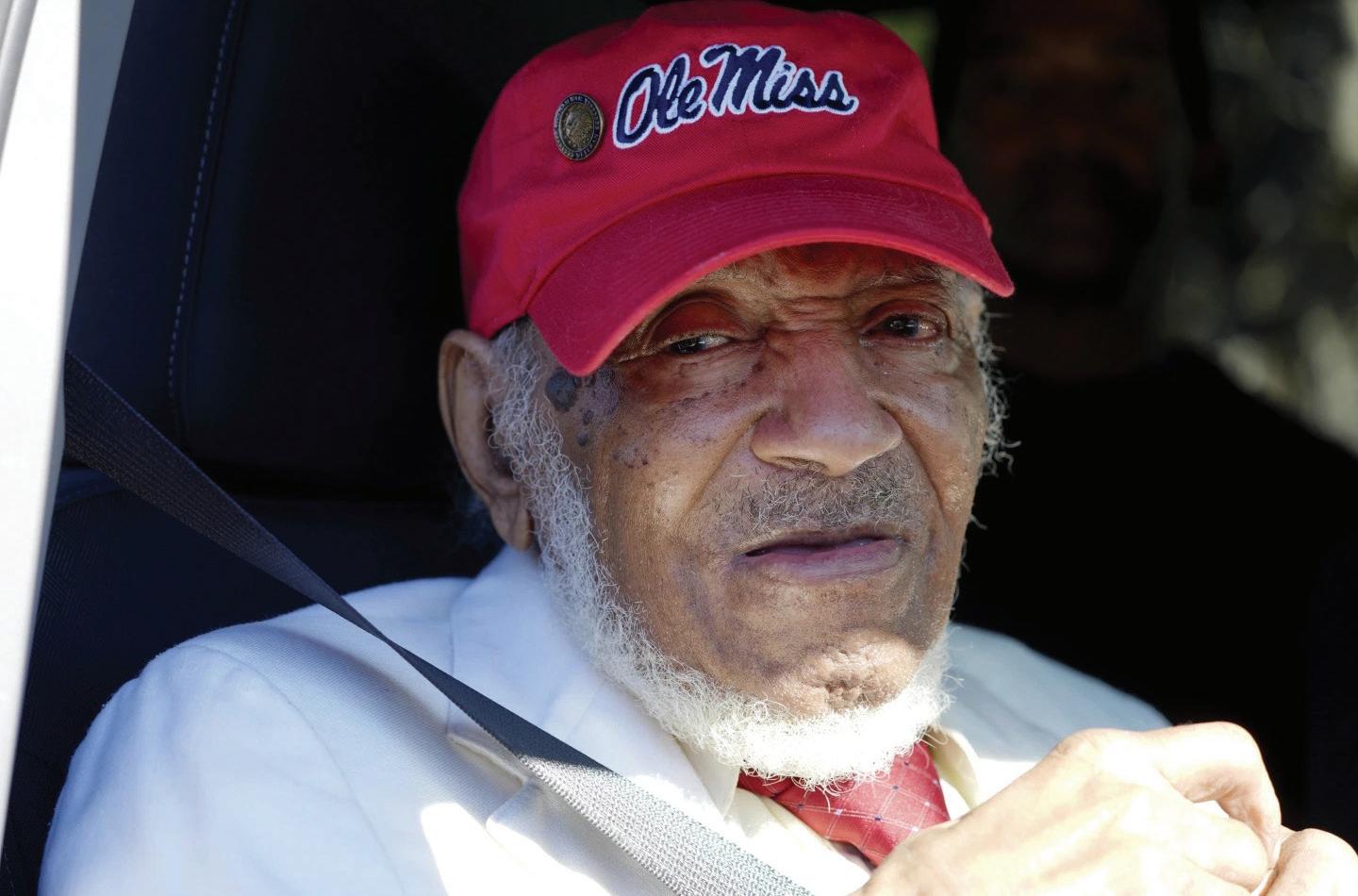
James Meredith, who became the first Black student to enroll at the University of Mississippi in 1962, acknowledges the crowd in Kosciusko, Miss., Friday, Dec. 20, 2024, during the unveiling of a historical marker.
A car speeds past a Mississippi Department of Archives and History marker recognizing the legacy of James Meredith in the Civil Rights Movement in Kosciusko, Miss.
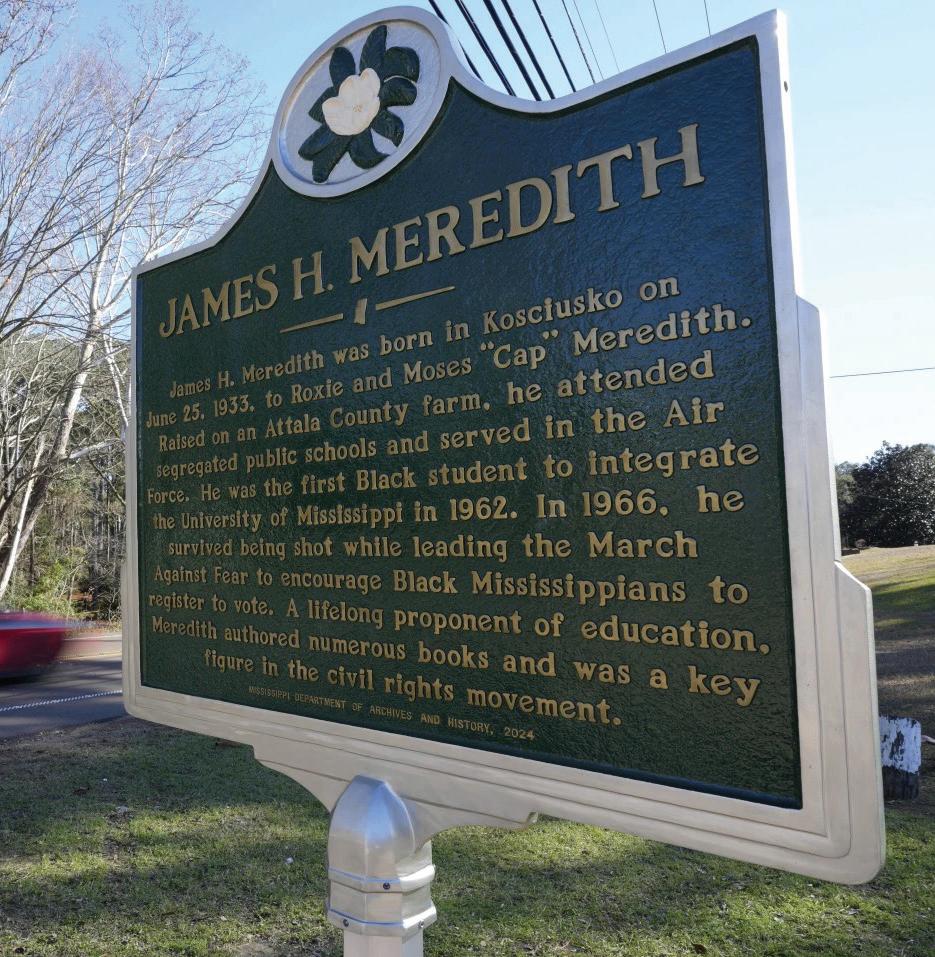

that merger. Parsons was named Time Warner chairman the following year, replacing AOL founder Steve Case, who also had championed the combination.
The newly formed company’s internet division quickly became a drag on Time Warner. The promised synergies between traditional and new media never materialized. AOL began seeing a reduction in subscribers in 2002 as Americans replaced dial-up connections with broadband from cable TV and phone companies.
Parsons stepped down as CEO in 2007 and as chairman in 2008. A year later AOL split from Time Warner and began trading as a separate company, following years of struggles to reinvent itself as a business focused on advertising and content.
A board member of Citigroup and its predecessor, Citibank, since 1996, Parsons was named chairman in 2009 at a time of turmoil for the financial institution. Citigroup had suffered five straight quarters of losses and received $45 billion in government aid. Its board had been criticized for allowing the bank to invest so heavily in the risky housing market.
Citigroup returned to profit under Parsons, starting in 2010, and would not have a quarterly loss again until the fourth quarter of 2017.
Parsons retired from that job in 2012. In 2014 he stepped in as interim CEO of the NBA’s Los Angeles Clippers until Microsoft CEO Steve Ballmer took over later that year.
“Dick Parsons was a brilliant and transformational leader and a giant of the media industry who led with integrity and never shied away from a challenge,” NBA Commissioner Adam Silver said.
Parsons, a Republican, previously worked as a lawyer for Nelson Rockefeller, a former Republican governor of New York, and in Gerald Ford’s White House. Those early stints gave him grounding in politics and negotiations. He also was an economic adviser on President Barack Obama’s transition team.
Parsons, whose love of jazz led to co-owning a Harlem jazz club, also served as chairman of the Apollo Theater and the Jazz Foundation of America. And he held positions on the boards of the Smithsonian National Museum of African American History and Culture, the American Museum of Natural History and the Museum of Modern Art in New York.
Parsons played basketball at the University of Hawaii at Manoa and received his law degree from Albany Law School in 1971. He is survived by his wife, Laura and their family.
By Emily Wagster Pettus The Associated Press
A new historical marker has been unveiled in the hometown of James Meredith, honoring the Black man who fought white supremacy by integrating the University of Mississippi in 1962.
Meredith, 91, wore a red Ole Miss baseball cap as he watched Friday’s ceremony from the front seat of a pickup truck owned by Kosciusko, a town of 6,800 that also is the birthplace of media mogul Oprah Winfrey. About 85 people attended, and many snapped selfies with Meredith and his wife, Judy Alsobrooks Meredith.
“Most important day of my life,” Meredith said in a brief interview.
“Over half the people here are my relatives,” he said. “And for relatives to stand out in the cold like they did — that’s something special.”
Meredith, who resists being called a civil rights leader, now lives in Mississippi’s capital city of Jackson. He was born in Kosciusko and grew up on a nearby farm. He graduated from high school in St. Petersburg, Fla., in 1951, and served for nine years in the Air Force before returning to Mississippi.
He attended Jackson State College — the historically Black school that is now Jackson State University — for two years before suing to gain admission as the first Black student at the University of Mississippi.
A white mob erupted in violence when Meredith registered at Ole Miss, and U.S. marshals protected him on and off the Oxford campus.
The university has honored him several times in the decades since then. Today, about 10% of students at the university are Black.
“He’s a man whose courage profoundly altered the course of history,” Kosciusko Mayor Tim Kyle said Friday.
While Meredith was enrolled at Ole Miss, his parents and some of his siblings lived in a small brick home in Kosciusko. The new historical marker is a short walk from that house, roughly where marshals would park when Meredith visited family in 1962 and 1963.
Florida State University professor Davis Houck and his students collaborated with the Mississippi Department of Archives and History on the new marker, which also notes that Meredith was shot during a 1966 “March Against Fear” — a planned walk from Memphis, Tenn. to Jackson, Miss., to encourage Black voter registration.
Meredith’s oldest son, John Meredith, is currently the City Council president in Huntsville, Alabama. He said he was unable to attend the unveiling of other historical markers honoring his father at Ole Miss, at the site of the 1966 shooting in Hernando, Mississippi, and outside the state Capitol.
John Meredith said he has fond memories of visiting his grandmother, known as Ms. Roxie, in the brick home in Kosciusko.
“So all of this is quite the homecoming for me personally, and obviously my father is ecstatic about being honored this way in his hometown,” John Meredith said. “It’s a great day for the Meredith family.”
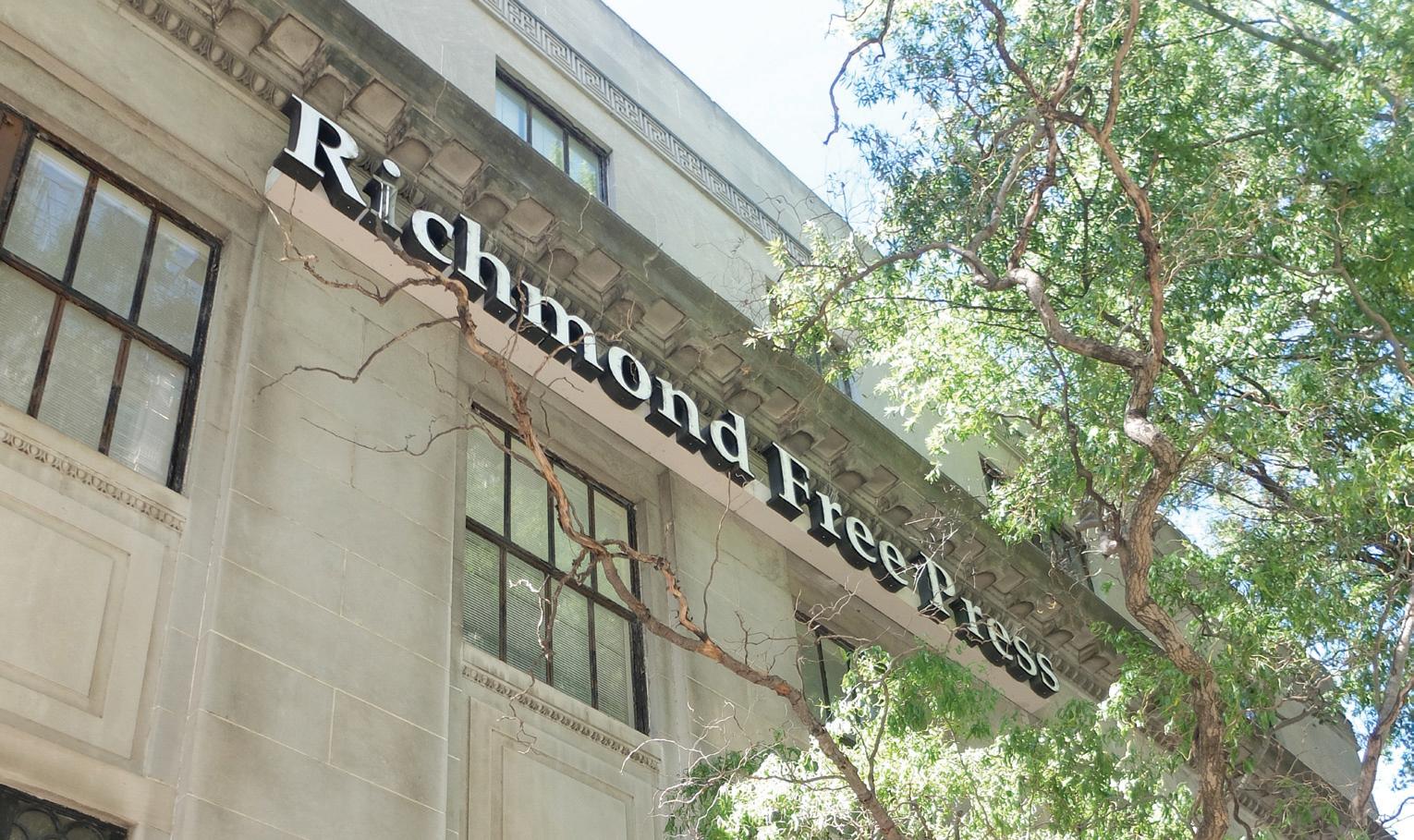


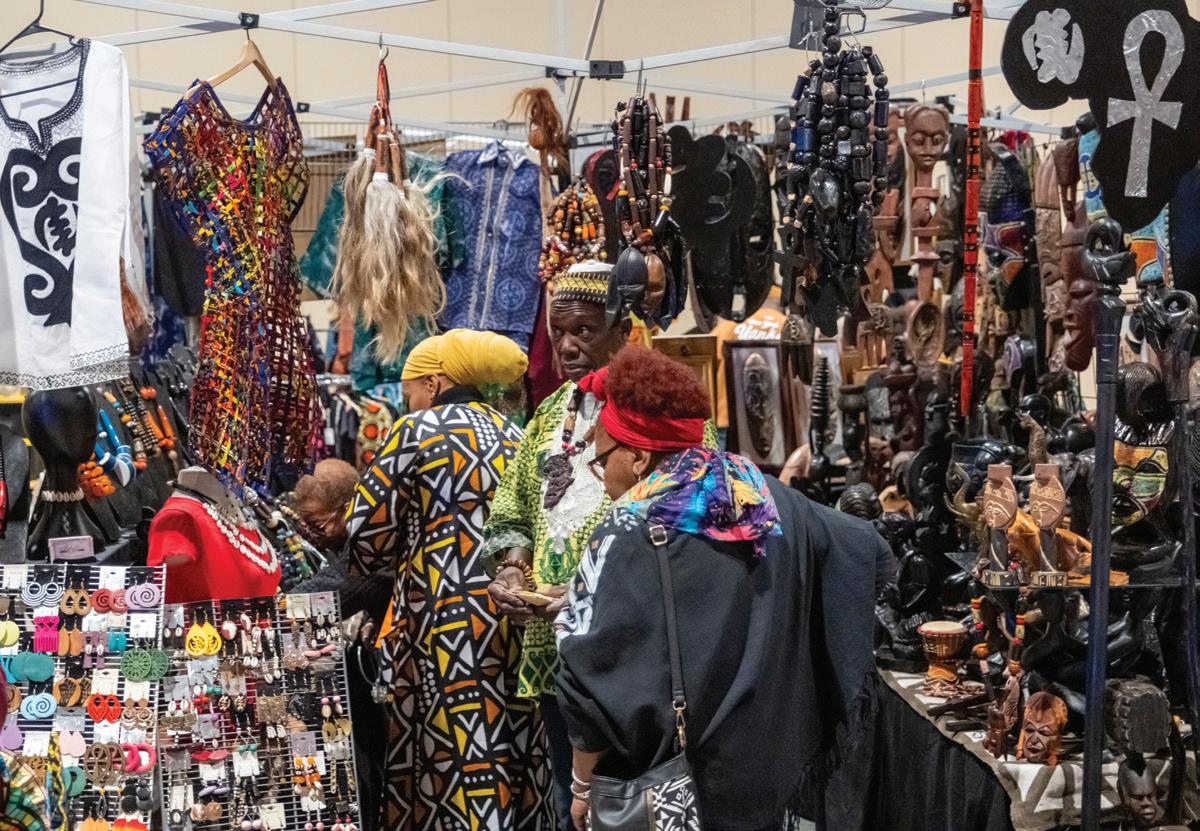
Continued from A1
why and how the data is used and protected.
The spring 2025 semester brings new changes to Virginia’s universities, preventing students with legacy admission status or connections to their college’s donors from receiving special consideration.
Families of first responders who have died due to their work will receive more financial support from the state. The death benefit payout from the Virginia Line of Duty Act has increased from $25,000 to $75,000 for those related to specific active or retired firefighters and law enforcement officers. The payout in-
crease applies to deaths that are caused by occupational cancers, respiratory disease, hypertension or heart disease.
Those looking to stay alert for infrastructure changes now have more options, as the Virginia Department of Transportation is now required to maintain a database of all approved utility work in a highway right of way in residential neighborhoods. Publicly accessible information includes a map, the location of the work, the start and projected end date of the work and the company administering the work.
Meanwhile, Virginians eligible for colorectal cancer screenings, including follow-up colonoscopies, will no longer have to pay any deductibles, co-insurance or other cost-sharing require-
ments from their insurance. Health insurers are now required to fully cover exams and tests, and this law applies to individual and group accident and sickness insurance policies, subscription contracts, and health care plans delivered, issued for delivery, or renewed in Virginia starting in 2025.
Finally, with the gubernatorial election set for November, some candidates could see a potential boost in their prospects for office. A new law states that any candidate running unopposed for a period of time is considered their party’s nominee, and their primary election is canceled if opposing candidates withdraw on or after the 44th day of the race but before the Tuesday before the election.
Continued from A1
most exciting adventures ever undertaken by the American people.”
In his biography “His Very Best: Jimmy Carter, a Life,” Jonathan Alter described Carter as “perhaps the most misunderstood president in American history.” In contrast, Kai Bird’s “The Outlier: The Unfinished Presidency of Jimmy Carter” highlighted his moral conviction in tackling issues others avoided, even at political cost.
After leaving the White House, Carter devoted himself to humanitarian work, transforming the role of former presidents. Through the Carter Center, founded with Rosalynn in 1982, he worked to promote democracy, monitor elections, and combat diseases like Guinea worm. The Center has monitored 115 elections in 40 countries and played a key role in nearly eradicating Guinea worm disease.
Carter and Rosalynn’s decades-long partnership with Habitat for Humanity further exemplified their commitment to service. Wearing tool belts and working alongside volunteers, they helped build or renovate more than 4,000 homes in 14 countries.
In 2002, Carter received the Nobel Peace Prize for his “decades of untiring effort to find peaceful solutions to international conflicts, to advance democracy and human rights, and to promote economic and social development.” Gunnar Berge, a Nobel committee member, called Carter “the best ex-president the country ever had.”

Carter’s post-presidency also saw moments of controversy. His 2006 book “Palestine: Peace Not Apartheid” drew criticism for its comparison of Israeli policies to South African apartheid. Yet, even in contentious circumstances, his tireless advocacy for peace earned him widespread respect.
“During his presidency,
Jimmy Carter advocated to have Medicare cover all Americans.
After his presidency, he continued humanitarian works that everyone, regardless of political affiliation, should respect,” said former Congresswoman Nina Turner.
Carter maintained a modest lifestyle, choosing not to capitalize on his presidency.

on Jan. 14, 1979, President
accepts the Martin Luther King
Nonviolence Peace Prize at Ebenezer Baptist Church in Atlanta. Right, The Camp David summit ended on Sept. 17, 1978. In this photo Egypt President Anwar Sadat, U.S. President Jimmy Carter, and Israel Prime Minister Menachem Begin sign an agreement in the East Room of the White House, thus creating a framework for peace in the Middle East.
He and Rosalynn lived in the same Plains home they built in 1961, and Carter often said he wanted their gravesite in Plains to benefit the local economy through tourism.
In their later years, the Carters celebrated milestones with family and friends, including their 75th wedding anniversary in 2021. Guests included civil

rights leader Andrew Young, country music stars
Brooks and Trisha Yearwood, and former President Bill Clinton.
“Simply put, Jimmy Carter was a good man,” said former Atlanta Mayor Keisha Lance Bottoms. “He was the epitome of a servant leader, changing the world and setting the highest example of what it meant to honor God, family, and country.” Carter is survived by his four children, numerous grandchildren and great-grandchildren, and a legacy of public service that transformed lives around the globe. He will be buried next to Rosalynn under a willow tree near a pond he helped dig in Plains.
Continued from A1
only three people — Noyce, Dail and another Patriot Front member known as “Christopher VA” — knew about.
The Ashe mural vandalism prompted Thomas Rousseau, Patriot Front’s national director, to require “leadership approval of any actions involving murals,” according to a court filing in the case from Gancarz.
Despite confessions in the vandalism case, no criminal charges have been filed.
Richmond Commonwealth’s Attorney Colette McEachin wasn’t aware Patriot Front members admitted culpability in the incident, but didn’t rule out future charges.
“[I]f an investigative report is produced by the state police or the Richmond Police Department or some other law enforcement entity that does investigations, then we’ll review it,” McEachin told VPM News. “We’ll see if there is enough evidence to ultimately prove a case beyond a reasonable doubt.”
In April, after videos of the vandalism were uploaded to YouTube, Richmond Police said detectives consulted with McEachin’s office and determined there wasn’t enough evidence to bring charges.
The videos show two masked people spray painting over the colorful mural of Ashe, tagging it with Patriot Front insignias.
When contacted last week about the case, a Richmond Police spokesperson requested VPM News share “court info or anything else you have to help facilitate this request.”
After the civil case’s filings were shared, another Richmond Police spokesperson wrote in an email that they’d “alerted Fourth Precinct detectives” and said “they are researching it.”
A spokesperson for Attorney General Jason Miyares directed VPM News to McEachin’s office when asked if the incident could be considered a hate crime under a provision in state code that includes incidents other than physical assault meant to “intimidate or harass any individual or group because of race, religion, gender, disability, gender identity, sexual orientation, or ethnic or national origin.”
“Hate crimes are under the jurisdiction of the local [commonwealth’s attorney],” the spokesperson wrote in an email. “As far as a hate crime goes, it only applies to assaults on people not destruction/vandalism of property.”
McEachin didn’t respond to a follow-up email on whether the vandalism could be considered a hate crime.
The mural of Ashe, a Black tennis icon and Richmond native, was eventually restored by Sir James Thornhill, one of the local artists who originally conceived of and completed the mural.
While the civil case was settled between the residents and five Patriot Front members, it remains active against Patriot Front, Rousseau, unnamed members and others.
The members who settled denied the lawsuit’s claim that Patriot Front is a white supremacist group that seeks a white ethnostate. Noyce and Dail admitted that the person recording the video, “Christopher VA,” who is named as “Defendant John Doe 1” in the lawsuit, said a racist slur after they began painting over Ashe’s face.
Amy Cooter is the director of research at Middlebury College’s Center on Terrorism, Extremism and Counterterrorism. She called the vandalism “a form of psychological terrorism.”
Cooter said Patriot Front members commonly share grievances online, but only recently moved into acts of public intimidation.
“Patriot Front hasn’t engaged in some of the street brawls that we would expect from the Proud Boys or other kinds of direct violence,” she said. “I think that the effect, regardless of the intent … is in fact to scare people, to discourage them from public and civic participation more
broadly, to effectively kind of clamp down on their ability to have a say in society.”
Patriot Front has some overlap with militia groups and shares ideology with overtly neoNazi groups, Cooter said. But she considers it a “nostalgic group” with a top-down national hierarchy and localized chapters.
Those individual chapters tend to stay in touch with each other, Cooter said, but mostly coordinate locally. While the national chapter might set the tone, local groups could decide to act autonomously.
“We have seen, we think, a general increase in groups like this since Trump’s first campaign,” Cooter said. “We’ve also seen some of the groups just being louder about ideas that they or other people have had for a long time.”
The researcher pointed to an array of potential causes for this, including the COVID-19 pandemic, and perceptions of lockdowns and the economy.
“It’s really hard to overstate Trump’s role in legitimizing some of this, in part by leaning into those other grievance narratives,” Cooter said.
Symbols of Patriot Front — which the Southern Poverty Law Center calls “a white nationalist hate group” — have been found around Virginia, including outside a Henrico County
in November and other states.

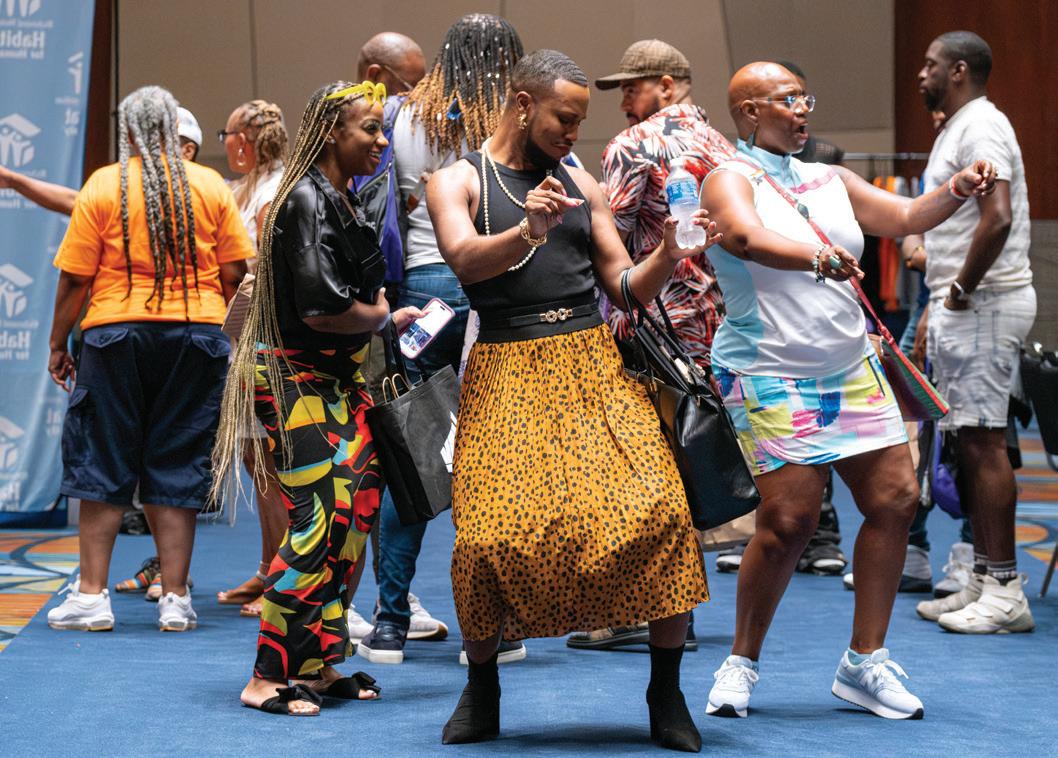




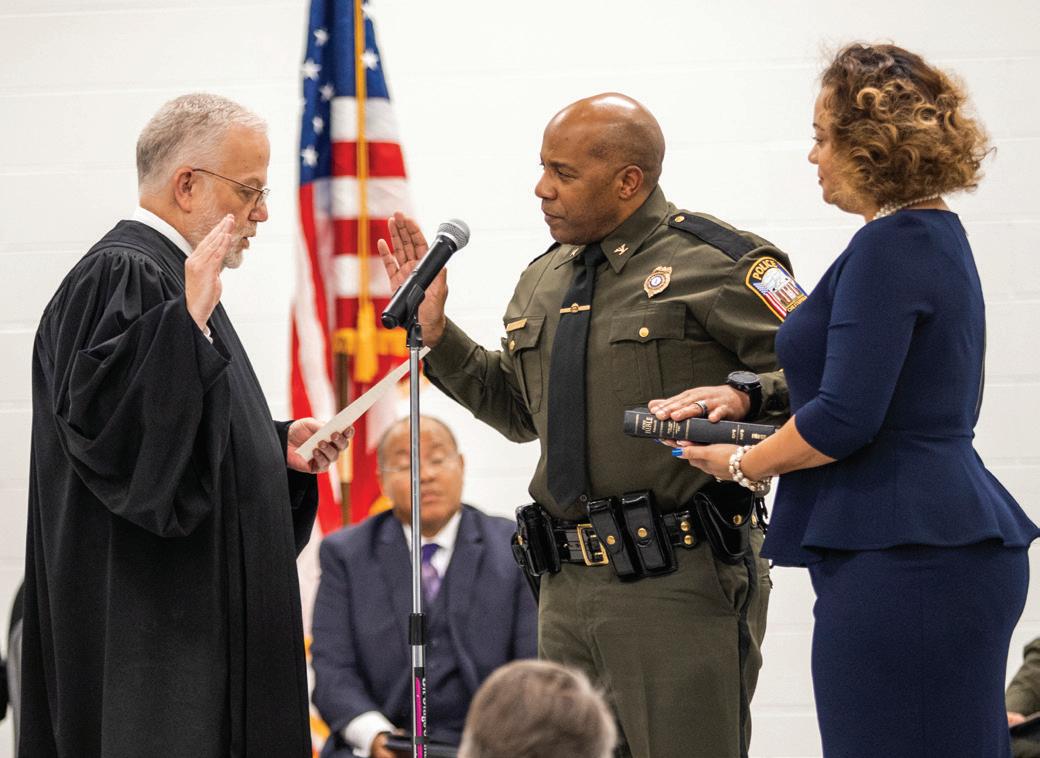

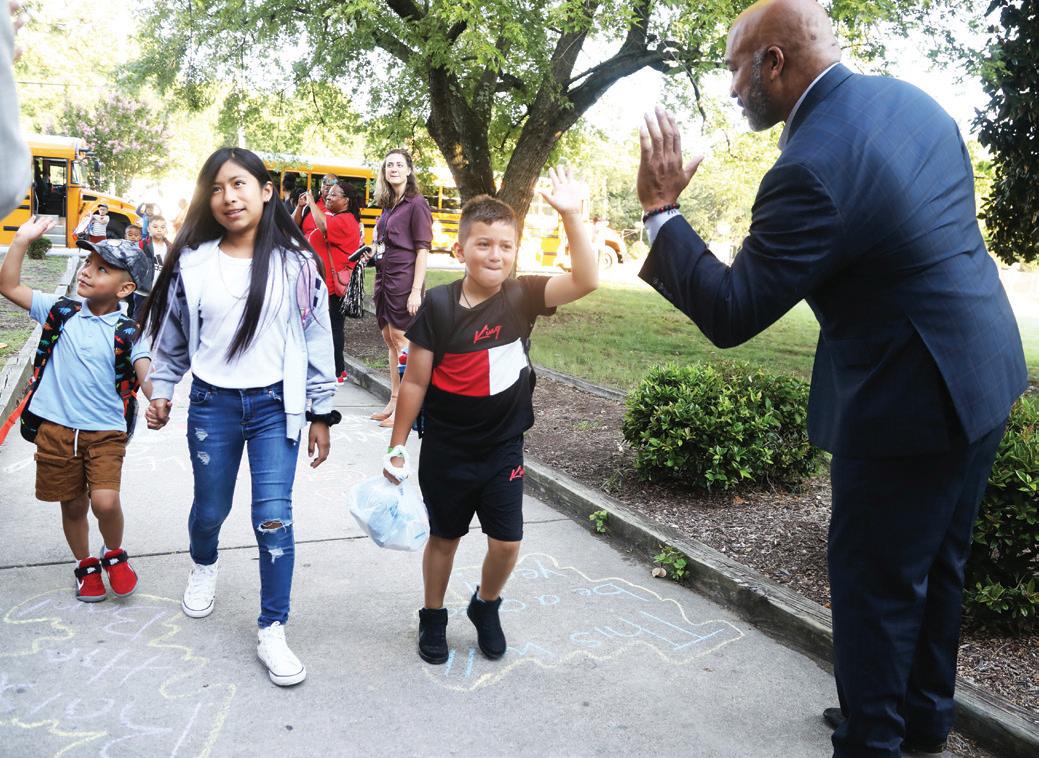


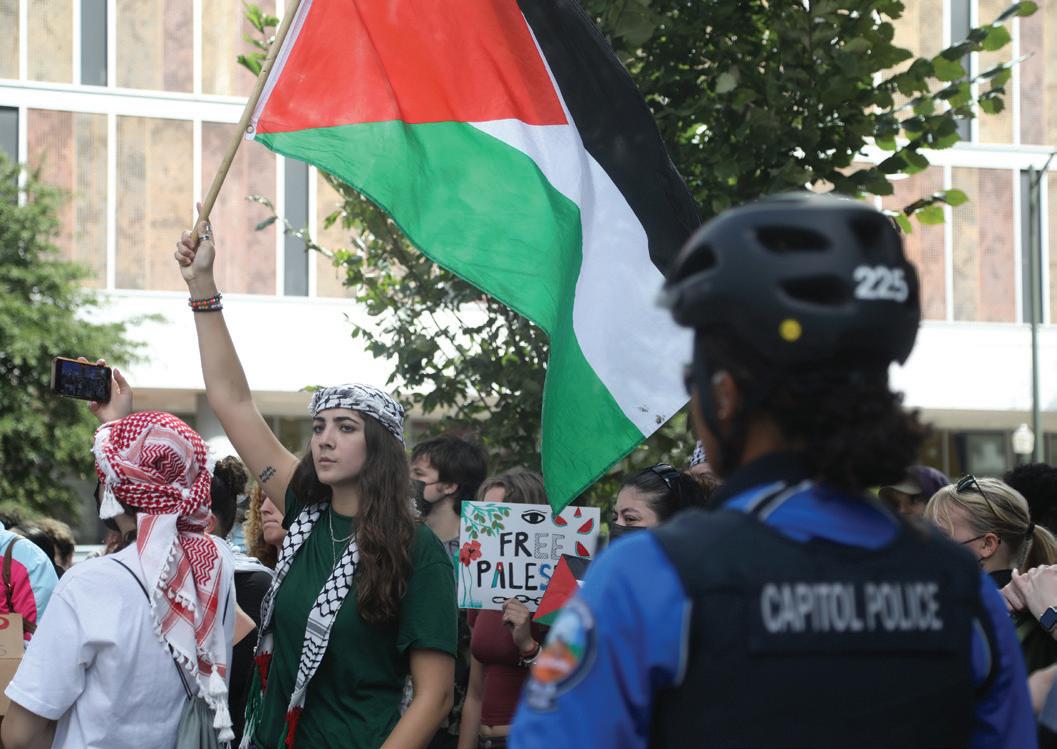
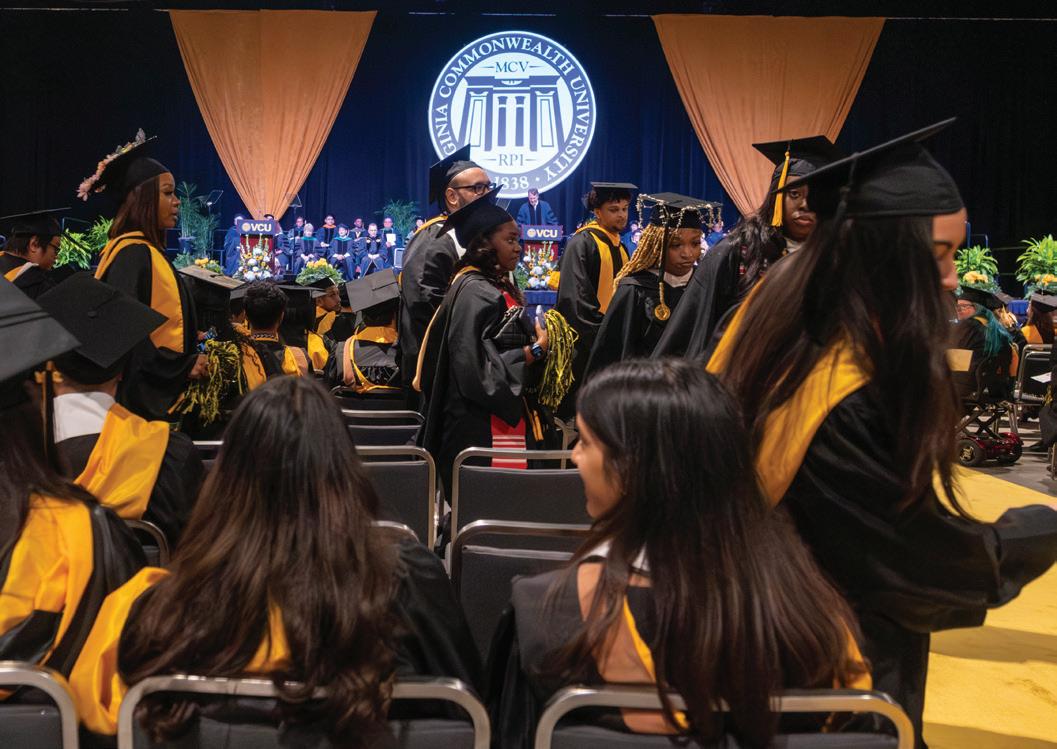

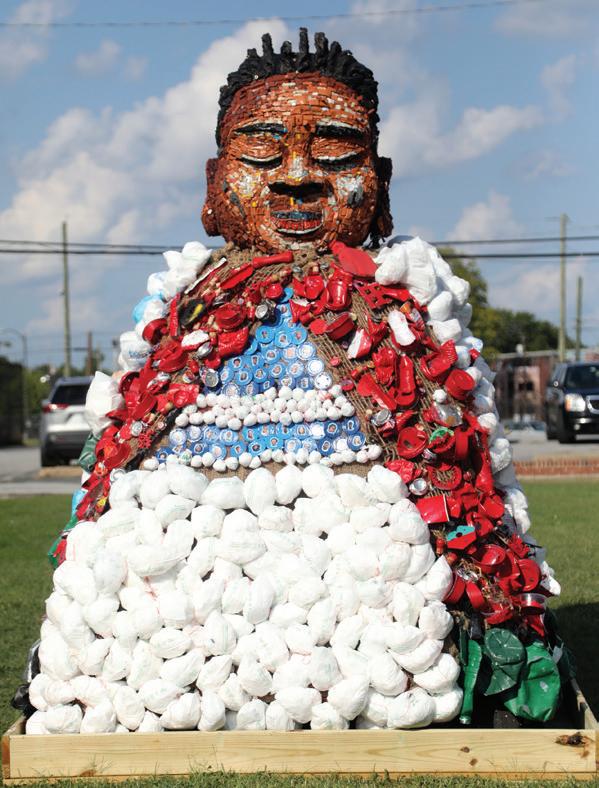

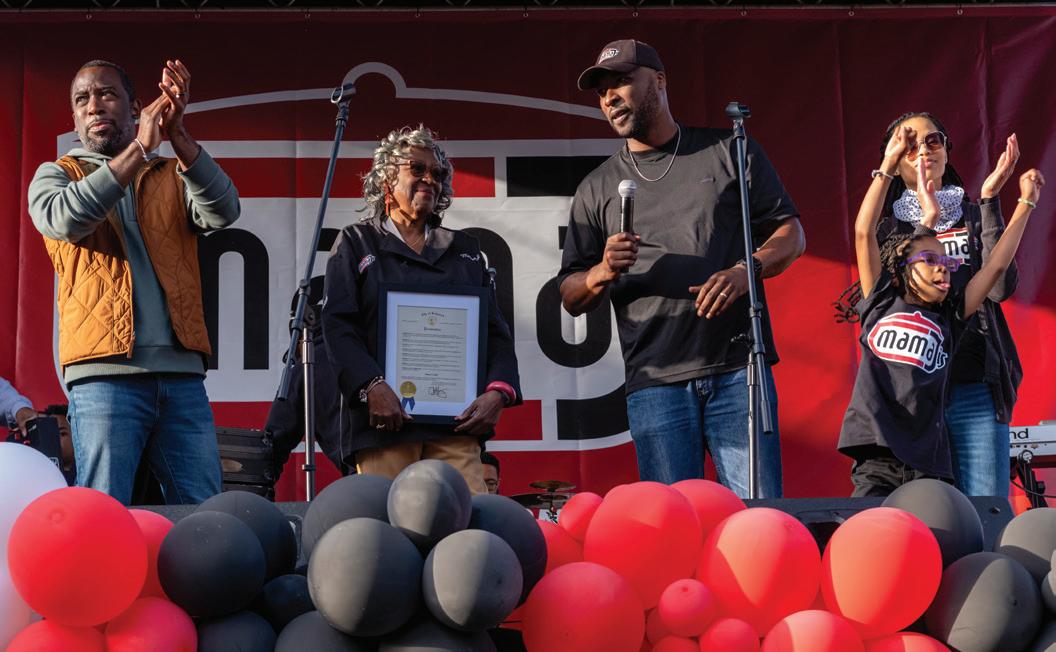


To our readers, Wishing you a 2025 blessed with good
and
positivity and
and empowerment, and laughter and
Thank you for your continued support during the past year. We look forward with hope for a bright 2025.
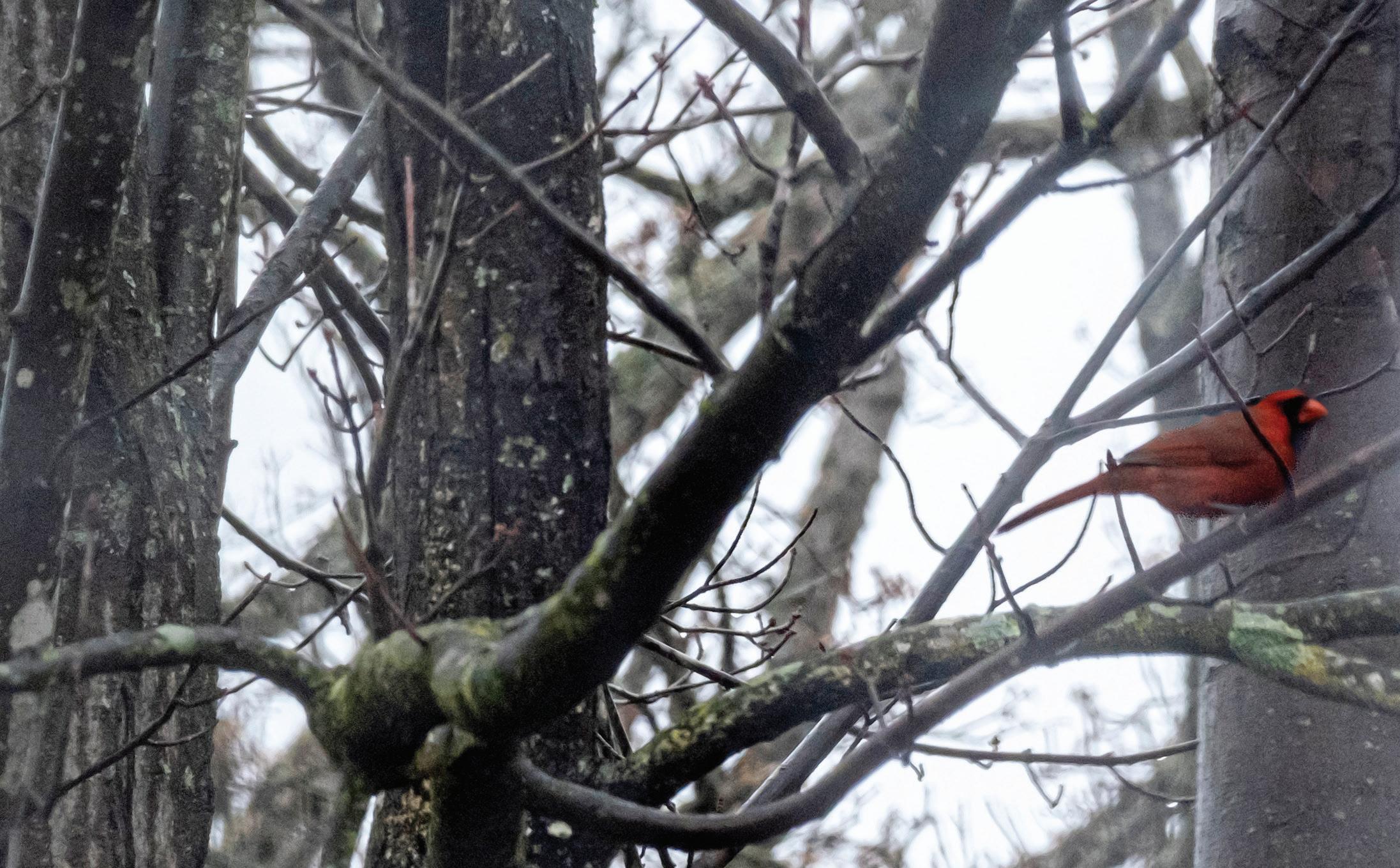
In 2000, Republican George W. Bush ran for president as a “compassionate conservative.”

Bush’s idea of compassionate conservatism was a way to return responsibility and accountability to individuals and, in doing so, free them from a life of poverty. The political slogan may have sounded good at the time, but Bush’s branding annoyed many of his fellow Republicans who found the catchphrase insulting. The phrase was “an attack and criticism on conservatives,” former Vice President Dan Quayle told the New York Times. “Conservatives are compassionate and that is my criticism.”
dent’s legislative team to “get rid of” the charity tax credits because the money was needed for another political priority: the $100 billion cut in estate taxes. With the rise of the Tea Party movement, Bush’s façade of compassionate conservatism was erased as a domestic agenda within the Republican Party.
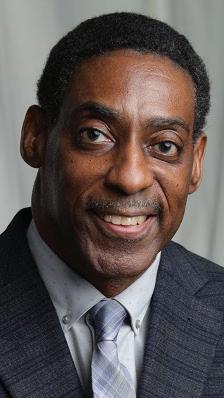
But when it came time for Bush to put action and policy behind the campaign rhetoric, he exposed himself as a “tax cut for the wealthy” Republican. When preparing the first budget under the Bush administration, Senate Finance Chairman Chuck Grassley provided $6 billion per year in tax credits to encourage charitable giving to organizations fighting poverty since it was one of the president’s campaign promises.
During the budget negotiations, Grassley was told by the presi-
During President Ronald Reagan’s first term in office, critics such as Don Mitchell noted homelessness as a visible problem in the U.S. As a
professor of human geography, Mitchell extensively wrote about homelessness and examined its structural causes. According to Mitchell, the increased cuts to spending on housing and social services under the Reagan administration were a contributing factor to the homeless population nearly doubling in just three years, from 1984 to 1987. This is an unknown part of the Reagan legacy.
In the closing weeks of his presidency, Reagan told news commentator David Brinkley that the homeless “make it their own choice for staying out there,” noting his belief that there “are shelters in virtually every city, and shelters here, and those people
still prefer out there on the grates or the lawn to going into one of those shelters.”
This false narrative that homelessness is about personal choices was developed during the Reagan era, and it continues.
The narrative became a deliberate attempt to misdirect public attention away from the human consequences of cuts to HUD’s affordable housing budget, which were used to cover tax cuts for the wealthy. Individual responsibility and accountability go both ways.
The main source of the problem behind today’s affordable housing crisis is the individuals responsible for creating enough investment in low-to-moderate income housing who fail to do so.
The Supreme Court didn’t help the housing crisis with its Johnson v. Grant Pass decision. The court announced that people experiencing homelessness can now be arrested and fined for sleeping outside.
Johnson v. Grants Pass is a court case filed in 2018 that determined it cruel and unusual punishment to arrest or ticket people for sleeping outside. The case started in Grants Pass, Ore., when the city began issuing tickets to people sleeping in public, even when there were not enough safe, accessible shelter beds. How does criminalizing homelessness address the permanent solution
Behind the “Lie of the Year,” some bitter truths
As it has been doing yearly since 2009, the fact-checking organization PolitiFact has chosen the Lie of the Year.
And, it turns out, they chose the same whopper I identified as a top contender months ago: Presidentelect Donald Trump’s unfounded claim that Haitian migrants were eating the household pets of Springfield, Ohio.
“In Spring field, they’re eating the dogs,” said the former and now future Republi can president during his Sept. 10 debate with, Vice President Kamala Harris.

Oh, really? An astonishedlooking Harris gave an incredulous laugh, but the line was not a new one for Trump and his MAGA movement supporters, including his running mate, Sen. JD Vance, whom Politifact cocredited for the Lie of the Year.
Yet, before I happily rip into that bone-headed attempt to slander innocent refugees living and working peacefully in Springfield, according to local officials and Ohio’s Republican Gov. Mike DeWine, who have welcomed their labor to the economically troubled town near where I grew up, allow me to note a leading alternative nominee in the eyes of some prominent conservative commentators: Democratic President Joe Biden.
“It’s hard to imagine a more perfect encapsulation of the total rot of American media than this,” huffed Dylan Housman, editor-in-chief of the conservative Daily Caller, in a column decrying Politifact’s choice for the dubious award.
Trump’s and Vance’s lie, Housman offered, “is the equivalent of a speck of dirt sitting at the base of a mountain that is one of the biggest scandals in American political history: the lie that Joe Biden was acting as president in 2024 and was mentally capable of serving another four years.”
Biden’s whopper deserves more attention, wrote Housman,
“because it tells us the media has learned nothing. Through all the navel-gazing, post-mortems and autopsies, the corporate media has learned nothing about why Donald Trump is president and nobody trusts them.”
Frankly, I’m not delighted by Biden’s broken promise to avoid pardoning his troubled son Hunter, either. Yet I can’t say I would not have done the same for my own son, especially if it looked — as it appears in Hunter Biden’s case — that he was mainly in trouble because of me.
But let’s get back to Housman’s conceit about “why Donald Trump is president.” It has much to do with the immigration issue, which in the spin of the Trump campaign was an edifice built on some truths but also a great deal of half-truths and outright lies.
Accusing Haitian immigrants in Springfield of eating pets had become a Republican talking point before Trump mentioned it in the debate. What apparently started as an unsubstantiated post in a local Facebook group spread through far-right and neoNazi social media before being laundered by more mainstream influencers and getting picked up by Vance and then Trump.
For Vance and Trump, the
Haitians were a convenient, symbolism-laden group to raise fear and suspicions about immigration and border security reform.
It didn’t matter that the 12,000 to 15,000 Haitians of Springfield were almost all there legally, having been granted Temporary Protected Status, and that many came to the town after being recruited to fill positions the local workforce couldn’t. And of course it didn’t matter that those who spread the stories of pet eating hadn’t made the least attempt to verify the facts.
In fact, after Trump’s ridiculous debate performance against Harris, CNN’s Dana Bash confronted Vance about the patent falsity of the story. His response was an astonishing admission: “If I have to create stories so that the American media actually pays attention to the suffering of the American people, then that’s what I’m going to do….”
So it was a lie, but it was OK because Vance and Trump needed anti-immigrant hysteria frontand-center in election coverage.
Soon after the debate, Springfield was experiencing multiple bomb threats, school closures and growing fear of the sort anyone would feel when their community suddenly is being targeted and terrorized by strangers, spurred by militant fanatics and paranoid conspiracy theorists.
I wish the Haitians well. As a former resident of that part of Ohio whose parents migrated there from Alabama, I was delighted to hear that the migrants apparently had fit peacefully and productively into the area until politics raised its ugly head.
We need to get back to giving newcomers a more proper welcome, but I guess we’ve got to get past another election first.
He voted
the funding for a public-private partnership to
experiencing
Turner, an associate Baptist pastor and former NFL player, was the first Black person nominated as a member of Donald Trump’s cabinet. Despite being a pastor, Turner’s voting record does not prove that the nominated HUD secretary will be a compassionate voice and advocate for the unhoused. The writer is the author of the “God Bless Our Divided America.”
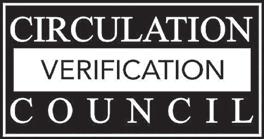



‘I upended my life to care for Mama, it was one of the best decisions I ever made’
It was an autumn morning in 2018 when my phone rang in Washington, D.C., and I’ll never forget the sound of Mama’s voice on the line. She was calling from her home in Virginia, 100 miles away. Her voice, normally warm and sweet, was instead rife with anger.
“Who took the knobs off my stove?!” she demanded. My heart broke toward her. All she wanted was to fry herself an egg for breakfast.
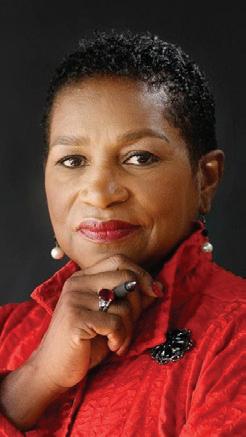
How could I tell her that her four adult children had met and decided to remove the knobs from her kitchen stove? We made this decision to protect her safety, as her doctor had informed us that she was in the early stages of dementia and we could no longer allow her to cook on an open range.
How could I tell her that the stove where she had for decades lovingly cooked all of our family’s favorites during the holidays was now off limits to her — forever. Her fried chicken, mac & cheese, sweet potato and apple pies would only be tasted in our imitation recipes.
Hearing her angst, I responded in what I thought was the best way possible at that time in order to avoid traumatizing her. I’m sorry, but I lied. I told Mama that the stove was broken and that my son, her grandson, Monte, had removed the knobs
temporarily until he had time to fix it.
That did it. She slowly calmed down. After all, in her eyes, Monte could do no wrong. We advised her to start heating up frozen meals in the microwave instead. As the disease progressed, it was not long after that difficult conversation that we made another sacrificial decision. We knew that Mama could no longer live alone. Period. We
Hazel Trice Edney
sought professionals in home care. But that assistance was limited.
I resolved that the love that she had bestowed upon our family all of our lives was enough for me to upend my life in order to now take care of her. So, I moved 100 miles outside D.C. to become her primary caregiver for as long as she needs me. For me, it required commuting to my home and business in D.C. often and assuring that she is never alone.
It’s a decision that thousands of family members around the country are making every day.
An AARP article reports that particularly African-Americans have a sense of community and culture when it comes to caregiving. For me, it was pure love.
I moved in just as COVID-19 hit. Thankfully, neither Mama nor I caught the virus during the pandemic. Still, it was almost impossible to protect her from an injury related to
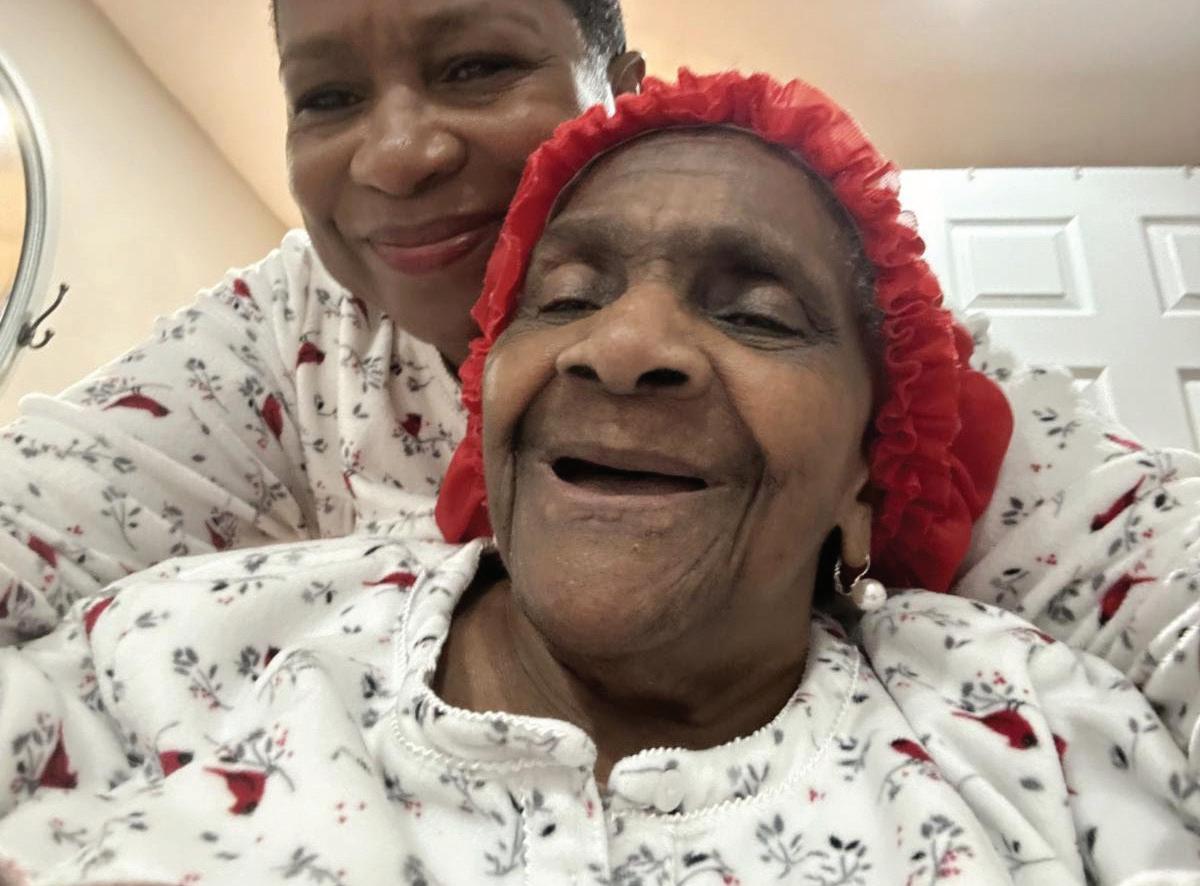
her instability on her feet from Alzheimer’s. In 2019, she fell and broke a bone in her back. In July 2020, she fell and suffered a fracture to her hip for which she had surgery. Last year, she suffered a hairline fracture in her lower leg, climbing into a van to go to church.
Now, five years since I became her primary caregiver, Mama, an award-winning Gospel singer, is now 90 years old and wheelchair- bound. Singing in churches since the age of 7, she doesn’t sing publicly anymore, but the joy that I have some evenings listening to and watching gospel videos on Youtube with her can never
be replaced. I love dressing her up and taking her to places and events she enjoys, like church, community gatherings, and even the funerals of close friends and relatives.
Throughout the journey, I have learned so much about this disease that is often emotionally painful to the patient and to the caregiver — regardless of how devoted. Here are just a few of my lessons learned that I feel are worthy of sharing with others:
I’ve learned to savor every beautiful moment. Sometimes Mama looks at me and asks me my mother’s name and I tell her. But most of the time,
she teases me and calls me, Hazel, the name that she and my Daddy gave me. I treasure every sweet moment.
I’ve learned to speak words of love and kindness to her, and exude patience even when I’m tired and frustrated. Know that despite how much you love them, you will sometimes become tired and frustrated. I learned how to avoid traumatizing her. In her illness, Mama sometimes asks about people who died a long time ago as if they are still alive. I used to tell her that person died years ago and even argue with her when she disputed me. But then I realized it was like
repeatedly breaking her heart with the news. Now, I just say that he or she is not here right now or something akin to that. Pretty soon, she moves on to something else.
I’ve learned to spend quality time with myself. Self-care is crucial for the caregiver. Attend an event that you enjoy. Take a vacation. Go shopping or just for a walk. I’ve learned to ask for help from people that I trust, or accept it when they offer. I learned that there is a lot of helpful equipment to prevent injuries to myself and to Mama. And a lot of it is free of charge from community organizations — wheelchairs, wheelchair ramps, Hoyer lifts, gate belts, transfer slides, portable commodes, shower chairs, etc.
I’ve learned how to say no. Some people may not understand your dedication and commitment to the care of your loved one. Sometimes you must be emphatic that you just can’t do something that others want you to do. I’ve learned to talk to her and answer her back, even when I don’t understand what she’s saying. When I first realized that I would be moving in with Mama to take care of her, I didn’t know how it would be possible. I just did it based on my faith in God that he would help me work it out. It turns out to have been one of the best heart decisions I ever made.
The writer is the founder of Trice Edney Communications.
In a symbolic rebuke of the American South’s racist history, an old Confederate monument now has a meaningful new life, four years after it was toppled in Virginia.
In June 2020, protesters in Richmond used ropes to pull down the bronze statue of Confederate leader Jefferson Davis, splashed paint on its surface and slung a toilet paper noose around its neck. Charged discussions over what should become of it followed.
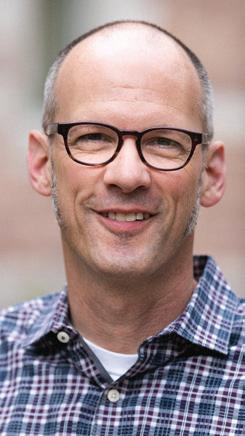
In 2022, the statue — carefully and controversially preserved in its degraded state and displayed on its back instead of its original upright position — went on display in a Richmond museum.
This year I visited the Davis statue in its new home. I am traveling to each of the 113 communities that removed or relocated Confederate symbols between 2015 and 2023 during the national reckoning sparked by the Black Lives Matter movement. As a sociologist who studies legacies of historical conflict, my goal is to understand how those sites — and the objects that for decades stood upon them — are reshaping where and how the Confederacy bears upon the nation’s current identity.
From monument to artifact Seven of the Confederate statues taken down over the past decade commemorated Jefferson Davis. A Mississippi congressman and U.S. secretary of war, Davis led the Confederacy between 1861 and the end of the Civil War four years later.
Before it was damaged and pulled down by activists in 2020, Richmond’s 8-foot bronze rendering of
David Cunningham
Jefferson Davis occupied a premier plot on the city’s famed Monument Avenue. Standing in front of a 60-foot Doric column, the statue proclaimed the president of the Confederacy a heroic “exponent of constitutional principles” and “defender of the rights of state.”
Now the Davis statue is at The Valentine — a museum that occupies the site of the studio where the statue was sculpted in 1903. Curators there have gone to great lengths to conserve the monument in its “2020 state.”
The pink paint covering much of its surface, toilet-paper noose and gleaming bronze surfaces —uncovered upon impact with the ground — remain.
These details offer physical evidence of the protesters’ challenge to the city leaders who erected the statue. Richmond put it up 50 years after the Confederacy’s fall, with a plaque calling
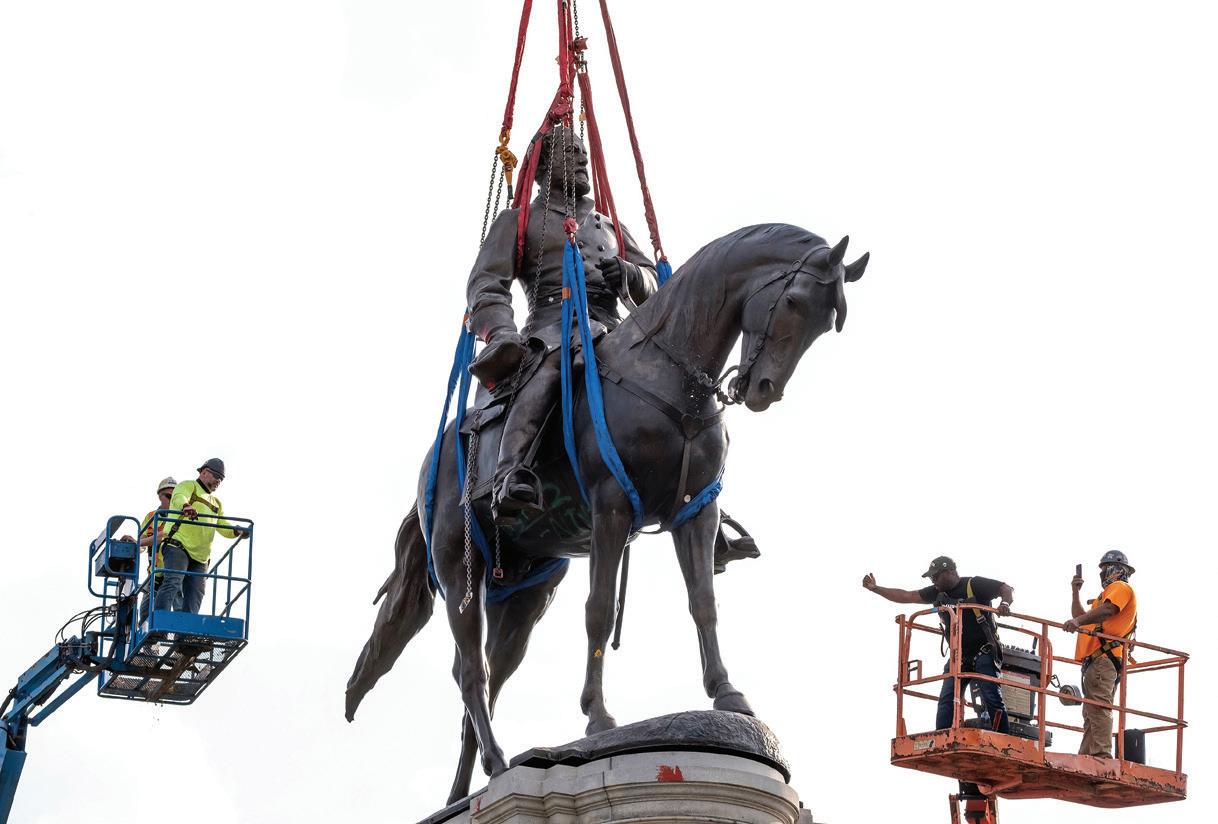
the Civil War an “unflinching struggle against overwhelming odds,” fought “to clothe their country with freedom.”
Such ostensibly lofty principles reflect the “Lost Cause” myth advanced by groups such as the United Daughters of the Confederacy, which helped to fund and place the monument in 1907. This Lost Cause account obscures the fact that Confederates, in fact, seceded from the Union to defend and perpetuate slavery.
Moving the statue from its public perch on Monument Avenue and into a museum transformed it from a commemorative object glorifying its subject to a historical artifact. And presenting the statue in its prone and damaged state makes its removal the center of that historical story.
Indeed, this unscrubbed statue still allows viewers to consider why Davis was celebrated in the first place. But they can no longer avoid reckoning with those who refused to allow him to remain standing.
Monuments and memory
Monuments removed entirely from public view quickly fade from public memory, as my 2022 study with Christina Simko and Nicole Fox found. Moving them to alternative sites, meanwhile, enables public conversation about them to continue.
Our research casts doubt on claims that movements against Confederate symbols seek to “erase history.” But who guides this process is pivotal
to a full and honest appraisal of the histories that these objects embody.
An hour’s drive south of Richmond presents a sharply opposing case.
That’s where another Confederate statue has been claimed by a local resident and displayed in a fenced area on the edge of a cornfield.
Its interpretative marker, installed as part of the cornfield display in 2021 after the statue was removed from the grounds of the nearby Isle of Wight County courthouse, has a critical bent. Yet its critique is not of Confederate supporters of enslavement.
“By 2020,” the marker reads, “historical monuments and memorials on public land were allowed to be vandalized and destroyed in many localities. It was decided by those who wanted to protect this monument that it should be taken out of government ownership and control.”
The government courthouse itself fails to counter this challenge. The monument’s original site includes no trace or mention of the statue that once resided there or why it was removed.
That lack of recognition remains the case with the majority of removed Confederate monuments. But a handful of other Virginia communities beyond Richmond do now provide a space for the public to grapple with these histories.
Warwick County’s courthouse in Newport News includes a weatherproofed display panel telling the story

of the Confederate monument that once stood there and explaining why and how county officials responded to activists’ calls to remove and place it in storage.
A cemetery in Hampton has added a plaque to the obelisk of its Confederate soldier’s statue that reframes the significance of the Civil War. It was, the plaque says, the beginning of “the path to freedom for millions of people who had been enslaved.”
And in Roanoke, a statue of Henrietta Lacks, whose “immortal” cell sample taken shortly before her death in 1951 continues to transform medical research, now stands where a monument to Confederate Gen. Robert E. Lee once stood. The Lee statue remains on view, but in a cemetery 2 miles down the road.
These approaches represent different and sometimes conflicting narratives about removed monuments. But the fates of all these statues and their grounds illustrate an unfolding movement to recast the connections between the past and today.
Who defines American values? In their respective reckonings with the Confederacy — and with modern racial justice movements — relocated Confederate statues are bellwethers of ongoing struggles to resolve this question.
The writer is a professor of sociology, arts and sciences at Washington University in St. Louis.
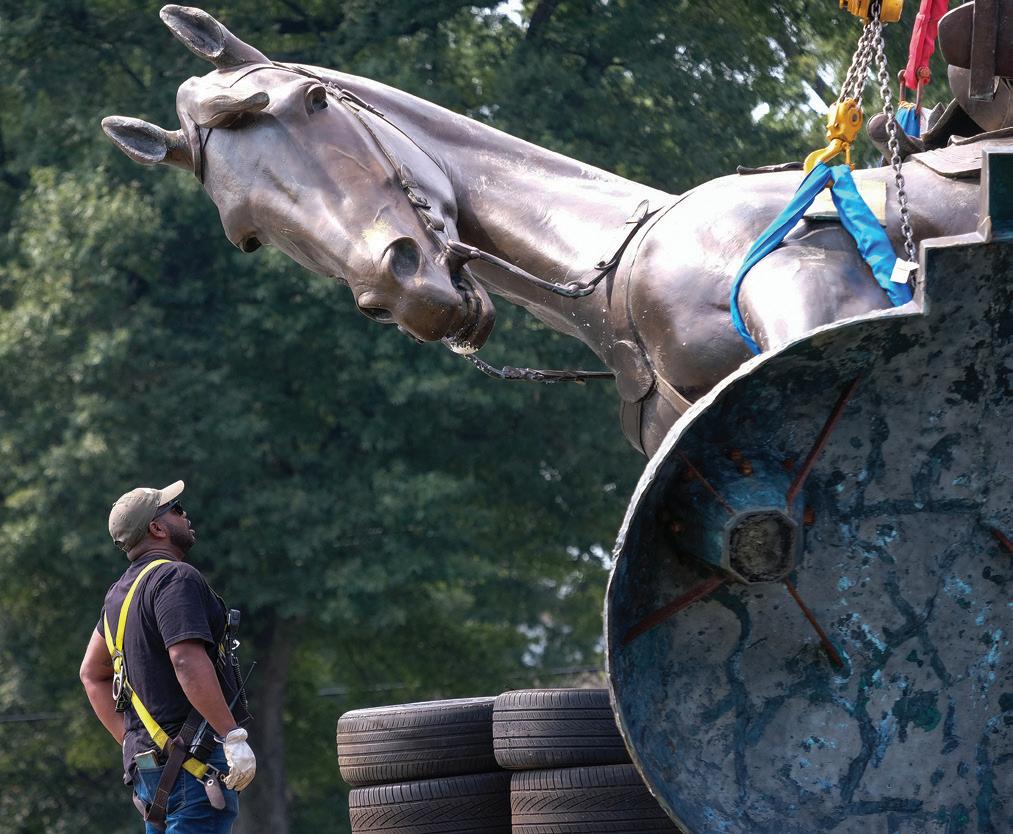
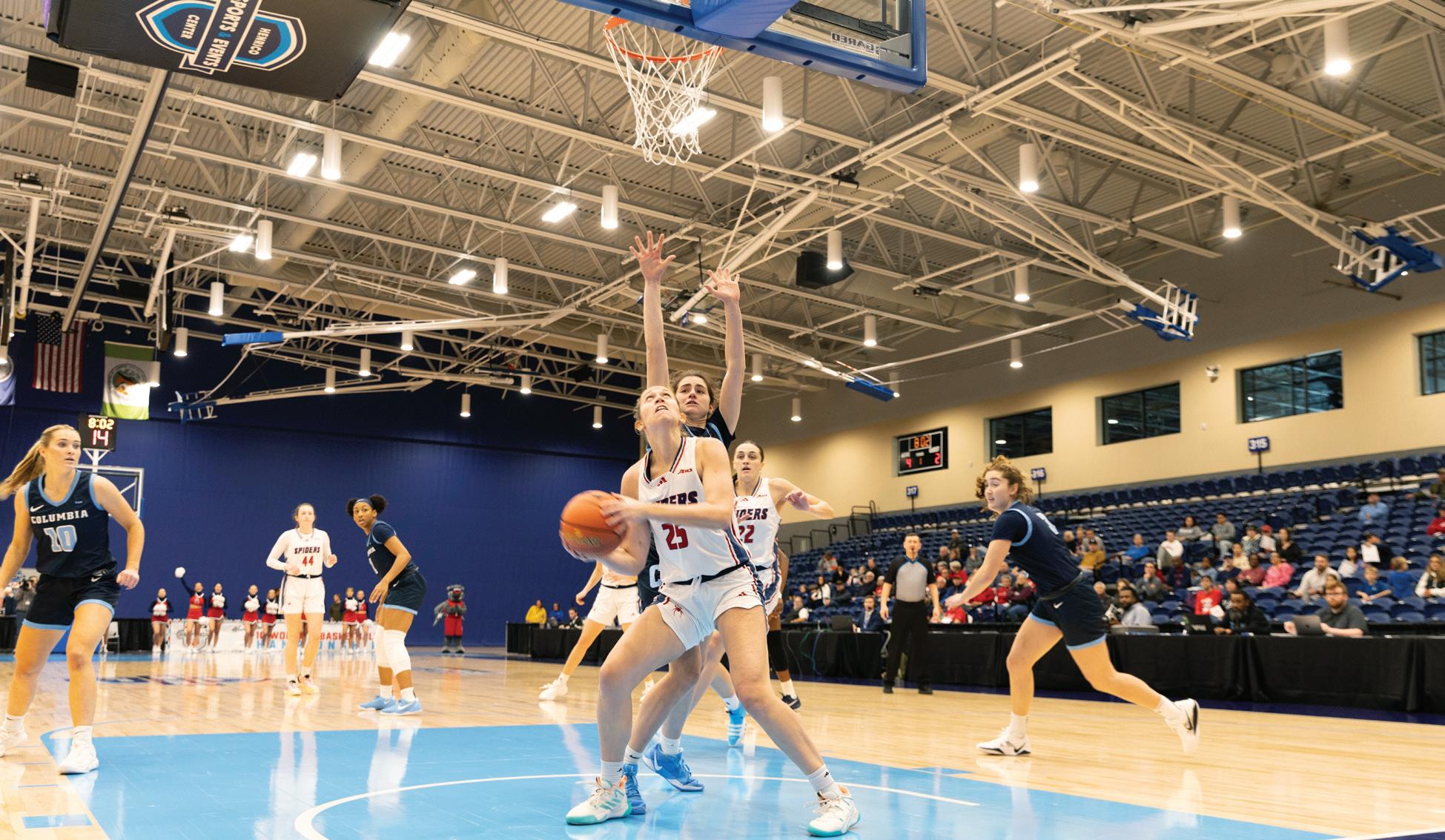
By Lyndon German VPM News
The motto of the Henrico Sports & Events Center at Virginia Center Commons in Glen Allen is “Showtime, all the time.”
Since the center’s grand opening in December 2023, over 375,000 people have attended events there. The center is the heart of Henrico’s sports tourism industry — which generated nearly $72.5 million in local economic activity in 2023 from “nonlocal tournaments,” according to county officials.
Earlier this month, Henrico celebrated the center’s first anniversary with a holiday donation drive, partnering with ESPN Richmond to collect sports gear for the Central Richmond Salvation Army. The three-day event also featured the inaugural “Battle of the Badges” basketball game between the county’s police and fire divisions.
“I think everyone’s just really pleased with seeing this vision come to life,” Dennis Bickmeier, director of the Henrico Sports & Entertainment Authority, told VPM News. “People have been amazed with the uniqueness of the building.”
The center hosted one of its marquee events just a few months after opening, the Atlantic 10 women’s basketball championship, eventually won by the Richmond Spiders. Over 16,000 people attended games over five days in March, and the tournament is returning to Henrico in 2025 and 2026.
Securing a significant event like a conference tournament in the center’s first year required a leap of faith from the Atlantic 10 and NCAA, Bickmeier said.
“The NCAA took a chance on us when we went and pitched them on bringing their tournament here with some really nice pictures and a good story to tell,”
Bickmeier said. “They trusted us. We’ve learned a lot in the early bidding process what this building can do and where it fits, maybe in the NCAA ecosystem.”
Henrico also hosted the National Wheelchair Basketball Association’s adult and junior national championship tournaments in April, with more than 1,100 players competing for national titles.
And the Virginia Sports Hall of Fame held its 2024 induction ceremony at the center in April — the first time the event has been hosted in Central Virginia since the Hall of Fame’s inception in 1972.
Bickmeier is proud of what he and his team were able to accomplish in a year.
“I’d say the A-10 tournament was one of our better accomplishments,” he said.
“But as a dad, to be able to sit in the stands and enjoy watching my daughter graduate from high school, that was pretty special too.”
Danny Bonifas, director of sports and events at Richmond Region Tourism, said the center already has become a significant draw to bring events to the Richmond area.
“This facility has, just in its one year of existence, already hosted some incredible
Former NFL receiver DeSean Jackson is taking over the football program at Delaware State. The school announced Jackson’s hire Friday in the latest move by a Mid-Eastern Athletic Conference program to hire a former NFL star as its football coach. Norfolk State hired Michael Vick last week.
“DeSean Jackson is a perfect fit for our institution — incredibly competitive, optimistic about the prospects for our collective future,” said Tony Tucker, the school’s new athletic director. Jackson joins a growing list of former NFL standouts who have taken over HBCU programs in recent years. Deion Sanders had success at Jackson State before heading to Colorado, and Eddie George guided Tennessee State to the
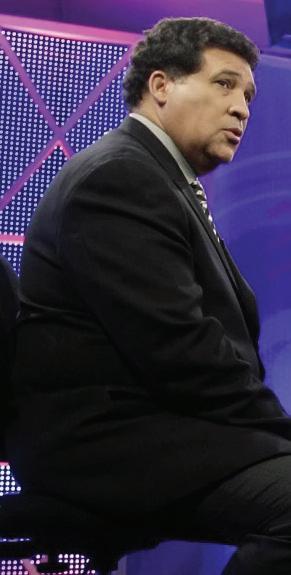
events,” Bonifas said. “That’s what makes this building so great. It’s multipurpose and presents so many unique opportunities for folks to use it.”
Beyond the impact on tourism, Bonifas said the local community also stands to benefit from having a high-quality facility close by.
“We’ve got plenty of talent right here in Virginia who don’t have to travel halfway across the country to take part in an event for their respective sport.” Bonifas said. “It’s not only a good economic benefit to have this building here, it’s also good for our own citizens who live, work and play right here…. They get to experience a first-class event at a first-class facility right there in our backyard.”
Plans are in place for further expansion of Henrico’s sports and events scene. The county is hoping to move forward with its GreenCity development, which will be anchored around another new arena, and construction is ongoing for two restaurants and two hotels that will complement the Henrico Sports & Events Center.
Amid the rapid growth, Bickmeier said his focus is on continuing to attract new events to Henrico.
“We are on the map from a sports entertainment standpoint,” Bickmeier said. “Our focus is to keep going with what we have, continue to bring in teams and special event opportunities, so that we add to the quality of life for our residents, because it gives them something … to come in and experience and enjoy.”
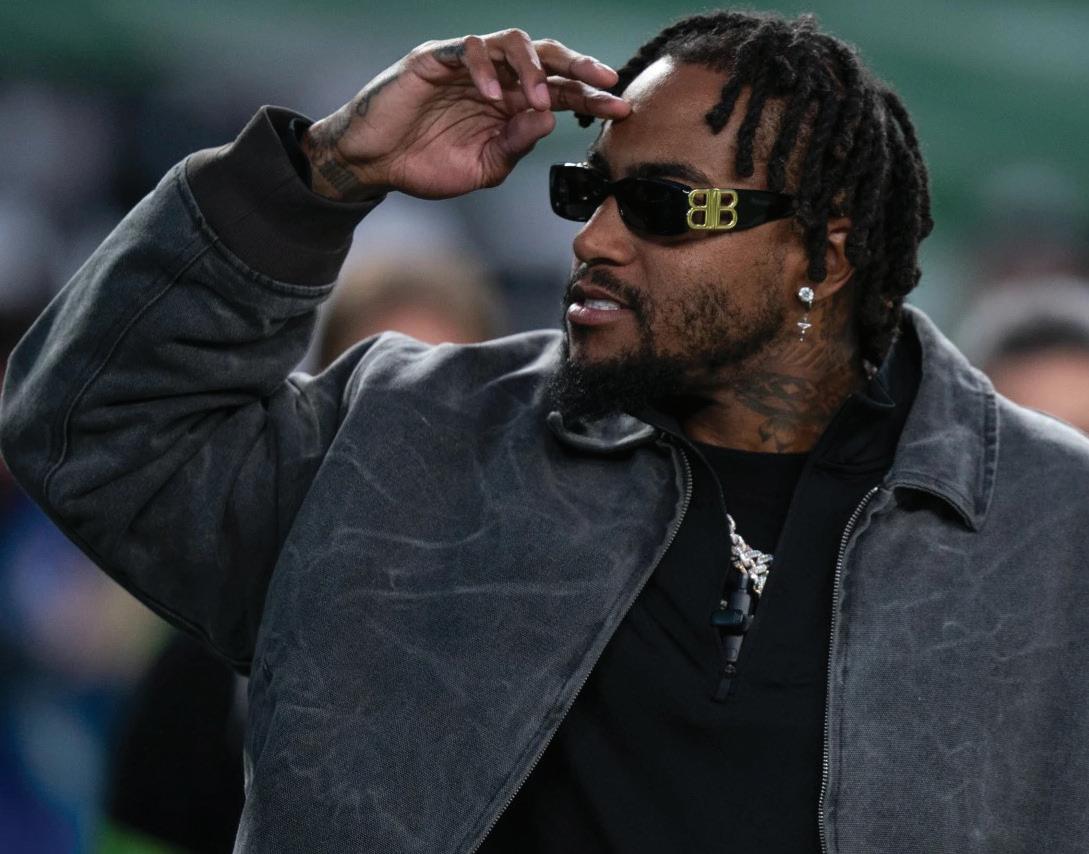
FCS playoffs this year.
Nominations
Free press staff report
Public voting is open for the fourth annual RVA Sports Awards, offering fans an opportunity to celebrate athletes, teams, and coaches who have significantly impacted the community. The awards highlight excellence in Richmond sports, with categories recognizing athletes, teams, coaches and standout moments of the year. Voting continues through Jan. 15.
The RVA Sports Awards feature a variety of categories, including: Female Athlete of the Year: Addie Budnik (University of Richmond Women’s Basketball), Gracie Ellis (Randolph-Macon College Softball), Carmen Gullickson (Vintage Boxing), Gillian Smith (Irish National Lacrosse Team) Male Athlete of the Year: Jada Byers (Virginia Union University Football), Brandon Eike (Virginia Commonwealth University Baseball), Zach Palmer-Smith (University of Richmond Football), Jack Smith (Randolph-Macon College Lacrosse) Team of the Year: Randolph-Macon College Baseball, University of Richmond Football, Virginia Commonwealth University Baseball, Virginia Union University Football Coach of the Year: Eric Ash (Vintage Boxing Gym), Ray Hedrick (Randolph-Macon College Baseball), Billy King (Sports Backers and Elizabeth Davis Middle School Cross Country), Aaron Rousell (University of Richmond Women’s Basketball) Moment of the Year: Richmond Flying Squirrels Stadium Groundbreaking, Randolph-Macon College Baseball Hosts Super Regionals, University of Richmond Women’s Basketball Wins A-10 Title in Henrico, Tri-City Chili Peppers Cosmic Baseball Youth Athlete of the Year: Jah’Kei Chavis (Armstrong High School Football), Rashaud Cherry (Thomas Jefferson High School Football), Cayman Goode (Henrico High School Baseball), Avery Hurley (Colonial Heights High School Volleyball) Youth Team of the Year: Atlee High School Boys Lacrosse, Benedictine College Preparatory Football, Midlothian High School Girls Soccer, Salem Church Athletic Association Football 14U Event Impact of the Year: Ukrop’s Monument 10K 25th Anniversary, Sportable Hosts NWBA National Wheelchair Basketball Championships, Virginia Commonwealth University Hoops HER Game, Varina Dig Pink Fundraiser The RVA Sports Awards will take place 7 p.m. Saturday, Feb. 8, at Altria Theater. Jackie Joyner-Kersee will host the ceremony, which will include entertainment and presentations honoring the winners. Tickets start at $75, with VIP tickets available for $125. Organizers encourage attendees to wear sneakers to complement the event’s sneaker ball attire theme. Tickets are available at visitrichmondva.com/rva-sports-awards


“HBCUs have much to be proud of in creating a more representative America. But that story is not simply a historical one. It continues to be written and includes the elevation of HBCU scholars and scholar-athletes in every field of human endeavor,” Jackson said. “The opportunity for me to help write another chapter here at DSU is a once-in-a-lifetime moment consistent with my journey as a young boy finding his way to manhood through mentorship, accountability, achievement and discipline.”
Jackson replaces Lee Hull after the Hornets went 1-11 this season. In addition to Hull’s departure, the school announced earlier this month that Athletic Director Alecia ShieldsGadson was stepping down at the end of the year, with Tucker replacing her.
By Hallie Golden The Associated Press
Greg Gumbel, a longtime CBS sportscaster who broke barriers during his career calling some of the biggest sporting events, has died from cancer, according to a statement from his family released by the network on Friday. He was 78.
“He leaves behind a legacy of love, inspiration and dedication to over 50 extraordinary years in the sports broadcast industry; and his iconic voice will never be forgotten,” wife Marcy Gumbel and daughter Michelle Gumbel said in a statement.
In 2001, he announced Super Bowl 35 for CBS, becoming the first Black announcer in the U.S. to call play-byplay of a major sports championship.
David Berson, president and CEO of CBS Sports, described Gumbel as someone who broke barriers and set standards for others during his years as a voice for fans in sports, including in
the NFL and March Madness.
“A tremendous broadcaster and gifted storyteller, Greg led one of the most remarkable and groundbreaking sports broadcasting careers of all time,” Berson said.
Gumbel had two stints at CBS, leaving the network for NBC when it lost football in 1994 and returning when it regained the contract in 1998.
Sean McManus said of all the moves he made in his nearly 27 ½ years leading CBS Sports, one of his proudest was bringing Gumbel back.
Gumbel grew up in Chicago and graduated from Loras College in Dubuque, Iowa, in 1967 with a degree in English. He had plans to become an English teacher, but after his brother Byrant Gumbel, got into sportscasting, he auditioned at WMAQTV, an NBC affiliate in Chicago in 1973. Gumbel won local Emmy Awards during his long career and was the recipient of the 2007 Pat Summerall Award for excellence in sports broadcasting.
Jackson is from Los Angeles and played college football at California, but his NFL career took him through Philadelphia, Washington and Baltimore, three teams in pretty close proximity to Delaware State.
“DeSean is like a son to me — a fierce competitor on the field, without rival, and a quality leader off of it,” said Kansas City Chiefs Coach Andy Reid, who coached Jackson in Philadelphia. “I could not be more supportive of his desire to coach Division I football and would stake my career on his success at Delaware State University. We are bound at the hip and are forever family. I cannot wait to see where he takes the university and where the university takes him. This is a win-win for everyone.”
Delaware State will hold its first news conference with Jackson on Jan. 8.
State commits to Henry Frazier III with
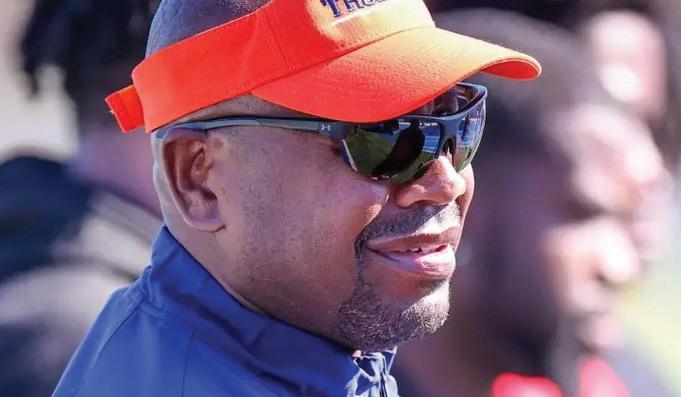
career record includes 91 collegiate wins.
When doctors told Melissa Weaver the lump she had felt for six months was not cancerous and didn’t need to be removed, they suggested it was due to hormonal changes. However, she wasn’t convinced and sought more conclusive answers.
Six months later, she got answers, although it wasn’t the diagnosis any woman wants to hear, especially at age 37. It was breast cancer. Her loving spouse, a Virginia Commonwealth University employee, suggested she make an appointment at the VCU Massey Comprehensive Cancer Center. Weaver took the advice and soon her journey began.
According to The Journal of the American Medical Association, breast cancer misdiagnosis occurs in 10% to 20% of cases. The delayed diagnosis of breast cancer is a leading source of error in clinical practice. When caught in its earliest, localized stages, the five-year relative breast cancer survival rate is 99%, according to research at the National Cancer Society.
One in eight women in the U.S. will be diagnosed with breast cancer in her lifetime, according to the research. Still, Black women have the lowest five-year relative breast cancer survival rate of any racial or ethnic group and are 40% more likely to die from breast cancer than white women.
“The care I have received at Massey provided hope when I could not rise from bed,” Weaver said. “They gave me compassion when shame and loneliness filled the corners of my life and purpose when I could not find my way after cancer.” Weaver’s new purpose has
been to help breast cancer survivors heal from the emotional and mental effects of cancer because she knows firsthand what a toll it can take.
“It’s important to talk about it,” she said. “The emotional scars are still there. How do I continue to fit in, connect and find meaning when treatment ends? What does my life look like now — my work, my relationships, being a parent?”
As a member services manager and consultant with Here for the Girls, a nonprofit offering social and emotional support, Weaver believes she’s found meaning and connection. She can help others by sharing her experience. As chair of the 30th Annual Women and Wellness Luncheon/ VCU Massey Comprehensive Cancer Center, she wants to continue to share wisdom from the past, gratitude from the present and hope for the future.
“Being a part of Women and Wellness has provided a way to use my voice to inspire others to continue to connect, educate, and advocate,” Weaver said.
Meet the breast cancer survivor who plays pickleball, discovered a passion for travel after her diagnosis, and this week’s Personality Melissa Weaver:
Volunteer position: Chair, 30th Annual Women and Wellness Luncheon/ VCU Massey Comprehensive Cancer Center.
Occupation: Mental health clinician and member Service manager at Here for the Girls, Inc. and H4TG Counseling. Here for the Girls, Inc. is a nonprofit organization that provides support to those facing a Breast Cancer Diagnosis.

Place of birth: Richmond.
Where I live now: Richmond.
Education: Master’s in social work, Virginia Commonwealth University.
Family: Spouse and two children, ages 16 and 18.
What is VCU Massey Comprehensive Cancer Center:
Founded in 1974, it’s a nonprofit organization part of VCU and a resource for cancer research, treatment and clinical trials as well as training of the region’s oncologists.
Mission: To reduce the state cancer burden for all Virginians by addressing the confluence between biological, social and policy drivers through highimpact, cutting-edge research; person-centered care across the continuum, from prevention through survivorship; community integration; and training the next generation of community-
centric researchers and healthcare professionals.
When, where and why founded: The center, named after a major gift from William and Evan Massey, was founded in 1974 to provide community engagement in cancer care and research.
Founder: Walter Lawrence Jr., M.D.
How long I’ve been involved with VCU Massey Comprehensive Cancer Center: As a patient, I have been involved with VCU Massey Comprehensive Cancer Center for 11 years and Women and Wellness for three years.
Why the center is especially meaningful to me: My father attended VCU. I received my undergraduate and graduate degrees from VCU and have been a School of Social Work instructor for 15 years. My spouse has worked for VCU for over 20 years, and my son recently began attending VCU. More importantly, Massey Comprehensive Cancer Center saved my life.
What is the 30th Annual Women and Wellness Luncheon: In 1995, a group of women with a shared mission gathered to create the event to share information and advocate for early detection and screenings while raising more than $5 million to drive research and innovation at VCU Massey. The event has grown into a tradition of women empowering women in the fight against women’s cancer.
Founders: Adrienne Maxwell, Julie Fritz and Judy Brown.
Purpose of luncheon: The 30th anniversary celebrates the evolution of women’s cancer research in that time and the quality of care, which means more and more people are surviving cancer each year. Because of this special anniversary, we will highlight Massey’s work in the fight against cancer and how the Richmond community plays an influential role in that fight.
Why I accepted the role as chair of the 30th Annual Women and Wellness Luncheon: I wanted to bring the vision of a “WE” are Women and Wellness to life. From the first moment people walk into The Jefferson Hotel to the final steps when leaving the event, I want people to experience a sense of connectedness to others and the mission of Women and Wellness. The story of Women and Wellness consists of hundreds of voices and I want them all to feel heard.
Event details: Feb. 4, 2025 at The Jefferson Hotel. Judith Pearson is the keynote speaker. Tickets are $175 and can be purchased at masseycancercenter.org.
How the event will benefit women and wellness at Massey: The donations through the event go to the Women and Wellness Fund, which specifically funds women’s cancer research at Massey.
30th Annual Women and Wellness Luncheon partners with: The partner list is wide, including the committee, Massey faculty and staff, the Jefferson, the speakers, the sponsors, etc.
How to contribute to the Women and Wellness Luncheon: Women and Wellness
offers many opportunities for involvement throughout the year. The “Ray of Hope” newsletter promotes all events at Massey, including Women and Wellness. Donations are accepted throughout the year, and we encourage people to join the committee to help with future events.
How I start the day: I would like to say that I start every day with an affirmation, and some days I am successful with this, but some days I wake up with a feeling of urgency to explore, experience and connect with life because I hear the clock ticking. The three words that best describe me: Determined, consistent and compassionate. If I had 10 extra minutes in the day: I would just sit in the quiet.
Best late-night snack: Popcorn.
Something I love to do that most people would never imagine: I love to sing.
My music playlist consists of: Songs that inspire me or tell a story.
A quote that inspires me: “What would life be like if we had no courage to attempt anything” — Van Gogh.
The best thing my parents taught me: The gifts of determination and curiosity.
Most influential book: “Love, Medicine and Miracles” by Bernie S. Seigel.
Next goal: To continue with the creation and deployment of a counseling center at Here for the Girls.


Free Press staff report
The Latin Ballet of Virginia will celebrate the 24th anniversary of its holiday production, “Legend of the Poinsettia,” with performances scheduled from Jan. 9 through 12 at the Perkinson Center for the Arts in Chester.
First staged in 2001 by the Latin Ballet’s founder and director emerita, Ana Ines King, the production has become a seasonal tradition. It highlights the cultural and religious customs of Latin America and Spain, bringing a unique perspective to holiday celebrations. The ballet’s annual performances share the significance of the poinsettia plant and its origins in Mexican folklore.
The story follows Maria, a young girl who has no material gift to offer the Baby Jesus. In her search for a meaningful gesture, she gathers weeds from the roadside. According to legend,
By Hilary Fox
The Associated Press
It’s Netflix’s resolution every new year to give viewers a headscratcher in January.
Since 2020, the streamer has released a U.K. miniseries based on thriller book by Harlan Coben over the holidays. It seems to have paid off: “Fool Me Once,” starring Michelle Keegan, Adeel Akhtar and Joanna Lumley, launched this past January and became what Netflix says was one of their most watched shows of the year, amassing 108 million views.
The new year’s seasonal suspense series is “Missing You,” based on Coben’s 2014 New York Times bestseller. It stars Rosalind Eleazar (“Slow Horses”) as Detective Inspector Kat Donovan, a police officer who specializes in finding missing people — apart from her fiance that vanished 11 years earlier.
“They know Jan. 1 is the sweet spot for them,” says actor Richard Armitage, who has appeared in each winter Coben adaptation, which relocates the stories from the books’ America to the north of England. “People have ownership over the show now, so like, ‘I want my Harlan Coben show on New Year’s Day. Give me my Harlan Coben fix.’”
“It’s perfect timing for the release, to be honest,” says co-star Ashley Walters. “Most people are going to be hung over or, you know, just not have

anything to do with the day.”
The show opens with the shock of Donovan’s ex-fiance (Walters) popping up on a dating app, over a decade after she came home one day to find him gone.
“I’ve ghosted people before,” laughs Armitage. “Just people you don’t want to talk to anymore. Not digitally though.”
Another star, Jessica Plummer, isn’t a fan of those who disappear without saying goodbye, though.
“I’d just feel too guilty,” she admits, calling it “cowardly and lazy — sorry Richard!”
Eleazar promises twists and turns along the way, adding that the actors weren’t initially
given the final two scripts and had to turn to the book to find out what happens.
Coben “really is a genius at taking you up the wrong track,” says Eleazar. “You’re so sure that this time you’ve got it right and it’s this person or this thing, but you are inevitably always wrong.”
“I would love to know, actually, how he starts a book, you know? Does it start with an idea or does he think of the most inconceivable idea and go, ‘That’s how it’s going to end’?” she adds.
Armitage agrees that “Missing You” does justice to the “hair-raising” shock ending of the book; “It’s like the rug is
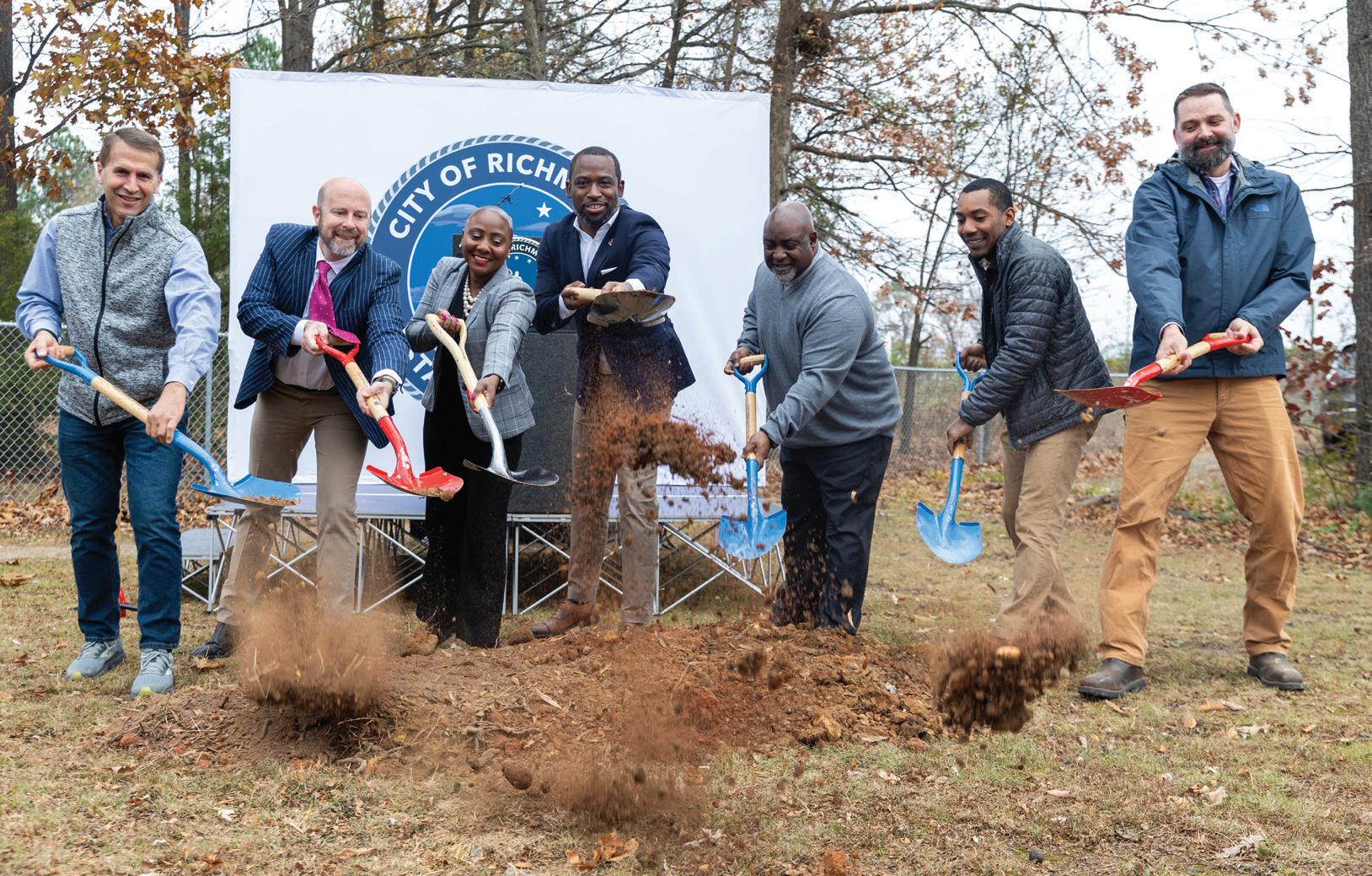
Andrew Alli, trails and greenways superintendent; and Ryan Rinn, capital projects planner. The 2-mile, multi-use trail will connect Westover Hills Boulevard to Hopkins Road, offering a safe route for biking and walking and enhancing access to South Side neighborhoods. Construction begins in the spring, with completion expected by December 2026.

her humble offering transforms into vibrant crimson flowers, symbolizing the importance of giving from the heart. This story is widely regarded as the origin of the poinsettia’s role in Christmas traditions across many cultures. Through a combination of dance, music, and narration, the production incorporates traditional Hispanic styles such as aguinaldos, gaitas, rumbas and plenas. These elements provide audiences with a glimpse into the joy and spiritual reverence of holiday customs in Latin America and Spain. The blend of reflective themes and festive energy has made the production a highlight for families.
Performances will be held Friday, Jan. 10, at 7:30 p.m.; Saturday, Jan. 11, at 3 p.m. and 7:30 p.m.; and Sunday, Jan. 12, at 3 p.m. Tickets are $35. For more information, or to purchase tickets, visit latinballet.com or contact the Perkinson Center for the Arts.
pulled away at the last minute.” And while audiences at home can binge-watch the whole five-part series as 2025 is still finding its feet, the cast will be busy with a variety of pastimes.
Lenny Henry, who portrays Kat’s father, jokes that he usually wakes up to a new year surrounded by roast potatoes, while wearing pajamas.
Armitage likes to be outside and start fresh by skiing down a mountain, while Eleazar has plans to celebrate in style: She and a group of friends have a tradition where they rent a castle and dress up in themed costumes.
Past New Year’s Eve parties have included donning 18th century garb in France and last year’s Versace-themed fete.
“I will be celebrating and really hoping that everyone loves this show on the first,” she says.

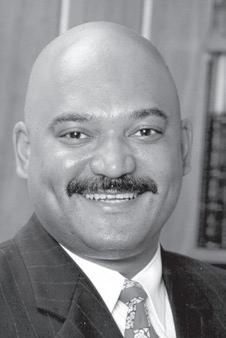


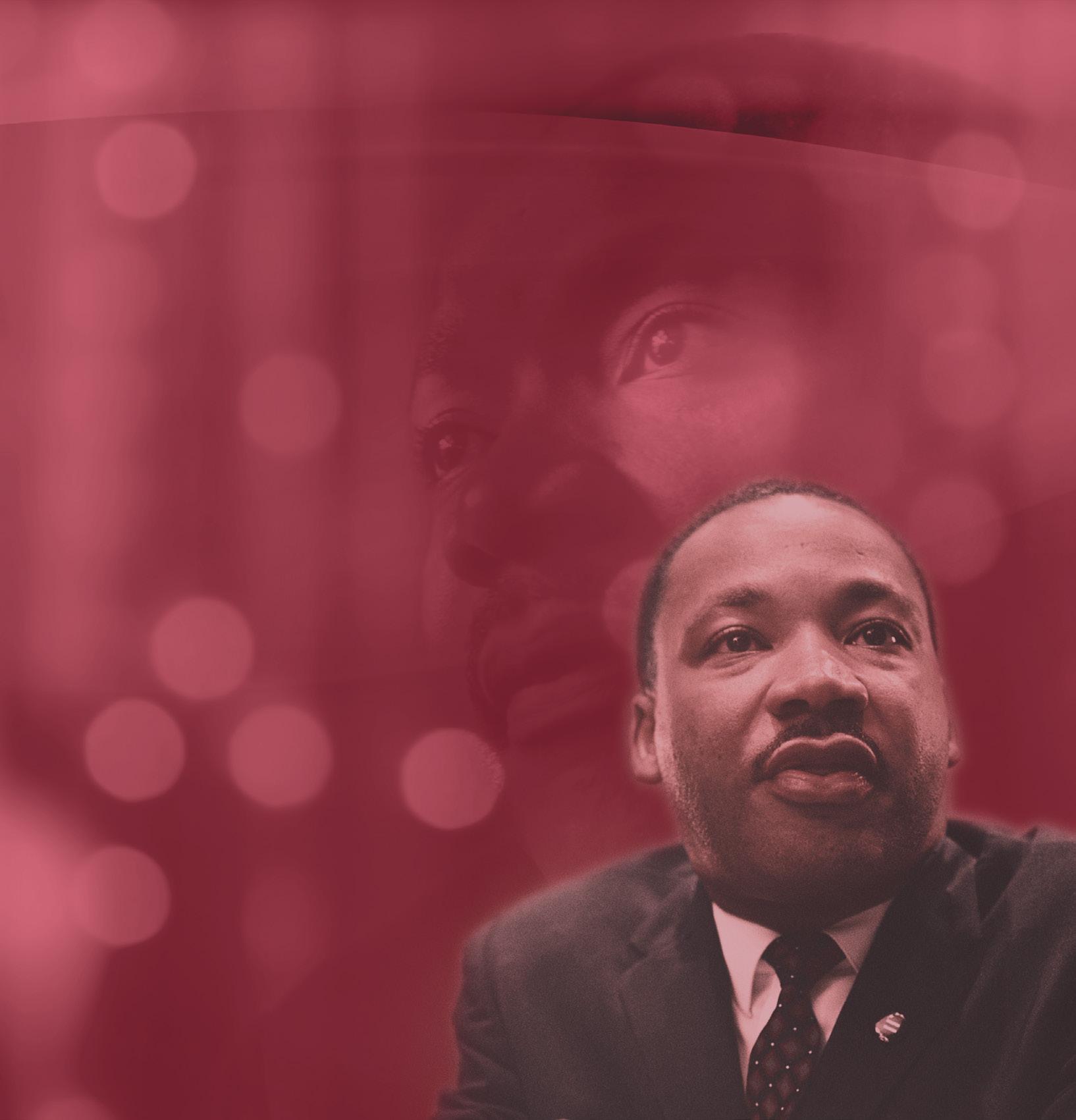
By George Copeland, Jr.
A voice that brought music and joy to many corners of Richmond fell silent on Christmas Day as Marjorie Ann Cunningham died at age 81. Cunningham’s talent and spirit resonated deeply with those who experienced her music.
Born April 7, 1943, in Richmond to Darcy Cox Gardner and William Gardner Jr., Cunningham grew up in a home that nurtured her love of music. Her father sang with gospel singer Sister Rosetta Tharpe, her uncle played with jazz musician Lionel Hampton and her brother, Stu Gardner, is a producer who composed music for film and television.
Cunningham began honing her vocal talents at the age of 7, performing in church choirs, and as a soloist while attending Maggie Walker High School. Her talents earned her numerous accolades in talent shows and citywide events. At 17, she joined the Jewel Gospel Singers as a soprano, beginning a decades-long association with the group.
As part of the Jewel Gospel Singers, Cunningham toured the East Coast, recorded three
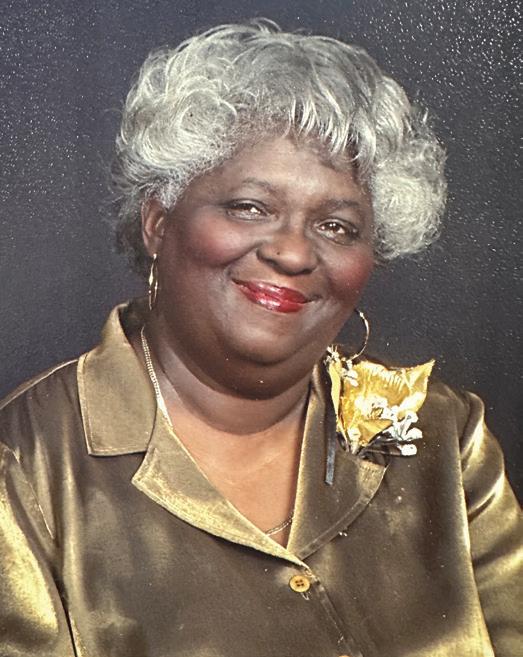
albums on the Savoy label and several singles. She earned recognition for the song, “Is Your All on the Altar,” which featured her powerful vocals. Despite the group retiring several times over the years, the Jewel Gospel Singers have regularly reunited, and Cunningham could always be trusted to be there, ready to contribute.
“She just sang all over since then,” said group co-founder Ellen Jefferson. “She was always available for rehearsals and programs.”
In addition to her work with the Jewel Gospel Singers, Cunningham performed with the gospel group, Gospel 440, produced by
her brother Stu, alongside Almeta Ingram, Tracy Montgomery and others. Her vocals contributed to some of her brother’s film and television projects.
“I knew where the best singer was — in my house,” Gardner said. “Why look anywhere else?” Cunningham also was a consistent presence

in Richmond’s music community. She sang regularly in area churches, served as a soloist for funerals at Scott’s Funeral Home and mentored aspiring singers. In her final years, Cunningham faced personal challenges, including living with cancer, yet she continued to be a warm and welcoming presence. Her family and collaborators remember her for the joy and encouragement she brought to their lives.
“I was always trying to keep her happy, because she kept me happy,” Gardner said, reflecting on her influence. Cunningham was preceded in death by her husband Rev. Major G. Cunningham, her parents, brothers Earl and William and her sister, Barbara. She is survived by her brother, sister-in-law Gloria Gardner, son Kevin, granddaughters Kierra, Kiana, Kyndra, and Katrina, seven great-grandchildren, cousins and friends.
A wake will be held Thursday, Jan. 2, from 6 to 7 p.m. at Scott’s Funeral Home. Funeral services will be held 11 a.m. on Friday, Jan. 3, at Trinity Baptist Church.
By Paula Phounsavath
Former Richmond Public Schools Director of Transportation Floyd Andrew Miles died Tuesday, Dec. 17, 2024 at the age of 64, leaving behind a legacy of public service.
His homegoing service was held Friday, Dec. 27, at First Baptist Church Centralia, where he had been a member since childhood. The service featured music from the church choir, prayers and remarks from family and friends.
“He made me better. He made me who I was. He was my right-hand man and I’m going to miss him tremendously,” said his brother, James Miles Jr. “Rest in peace, my brother. I’ll see you again one day on the other side.” Miles had a distinguished career in public transportation, ministry and community leadership.
He graduated from Thomas Dale High School and earned a business administration degree from Stratford University in London. He later received ministry certifications from New Life School of Continuing Ministry, Evans Smith Training Institute and Virginia Union University’s School of Theology. Miles then earned a doctorate in divinity from Norfolk Theological Seminary College and a doctor of humane letters from Alabama Interdenominational Seminary. Ordained in 1997, he also served as a counselor for The 700 Club with the Christian Broadcast
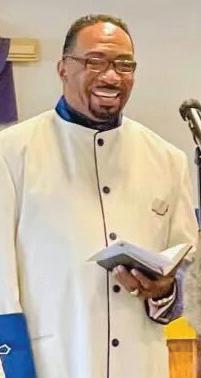
Network. In 1998, he became pastor of Mt. Salem Baptist Church in Staunton, overseeing

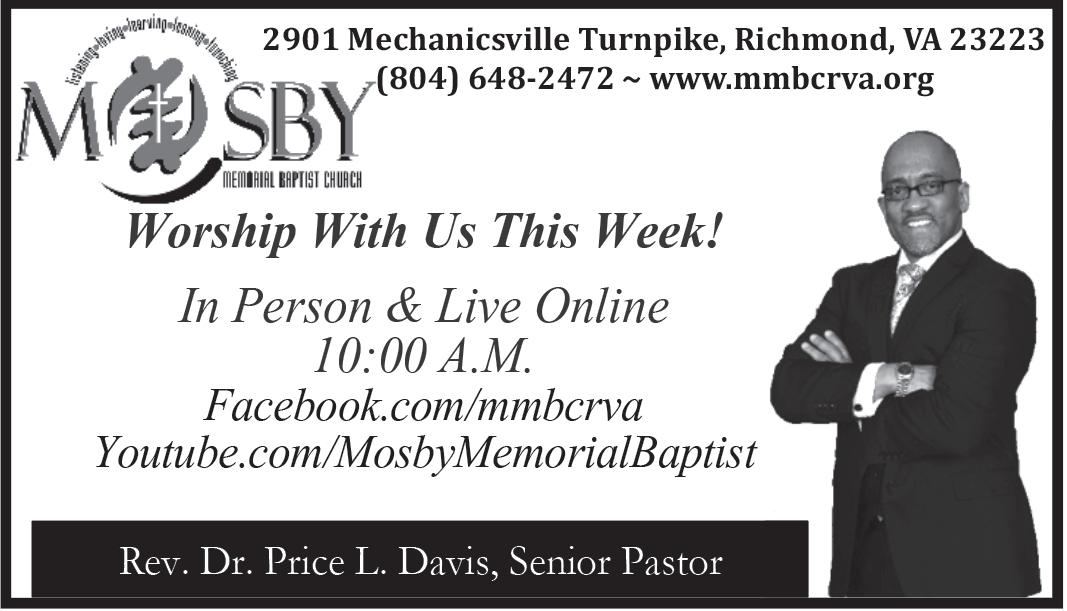
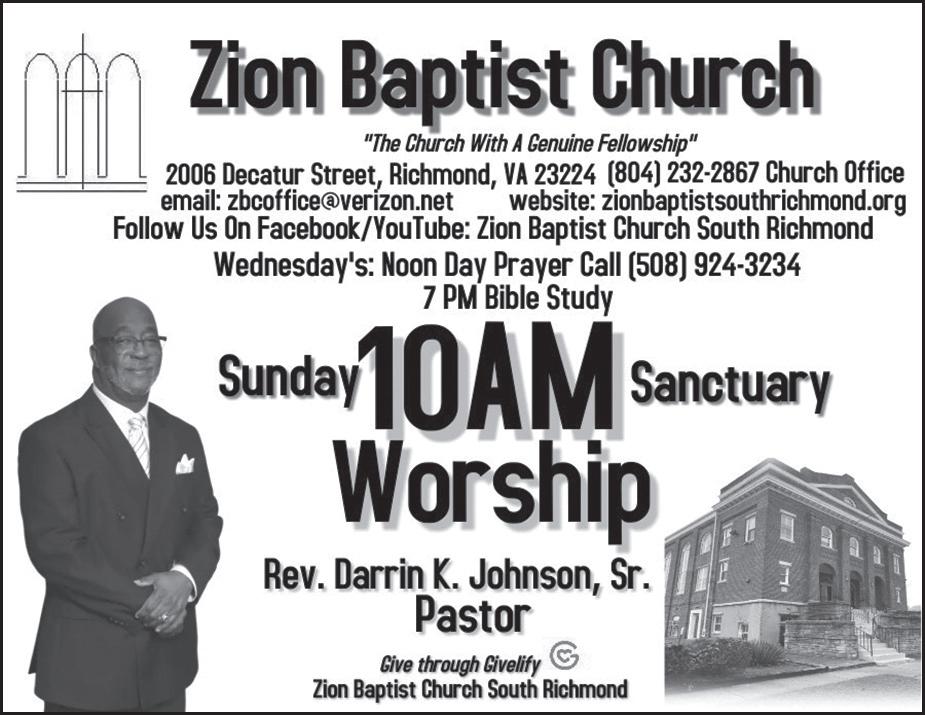

a new sanctuary, expanding the children’s ministry and fostering a growing membership.
From 1990 to 2008, Miles worked as a manager for Greyhound Lines. He then served as director of transportation for Petersburg City Public Schools (2008-2012), assistant director for Chesterfield County Public Schools (2012-2014) and
director of transportation for Richmond Public Schools until his retirement in February 2023.
Miles also was active as a board member for several organizations, including the North Boulevard Business Association, Richmond Boys Choir and Chesterfield County Democratic Committee.
Miles’ cousin, Regina
George, read a public statement from Richmond Public Schools Superintendent Jason Kamras during the service. Kamras offered his condolences to the Miles family and expressed gratitude for his contributions to the RPS community.
“Mr. Miles was a valuable member of our team in the student transportation department,” Kamras’ statement read. “May you find comfort in your cherished memories during this difficult time. We are grateful for his service to Richmond Public Schools.” Miles is survived by three brothers, five nephews, three step-nieces, two step-nephews, and numerous family members and close friends.
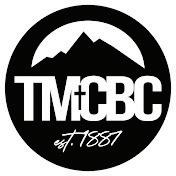

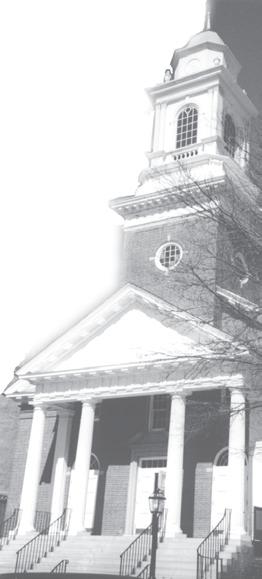
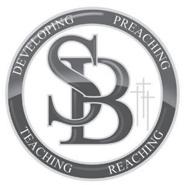



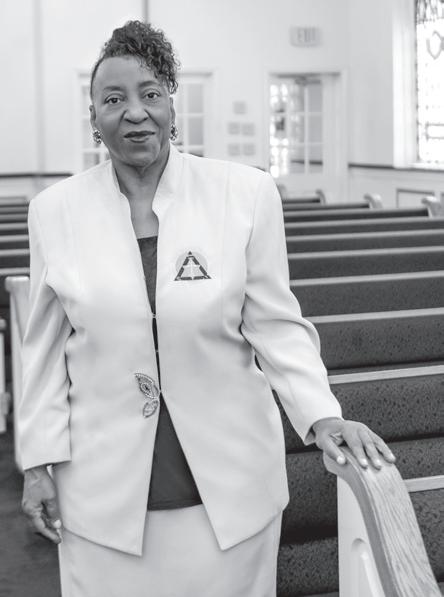




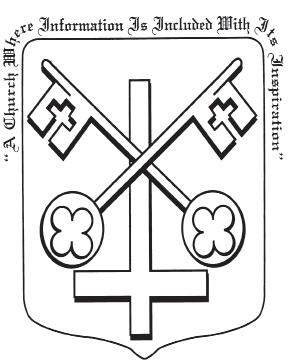




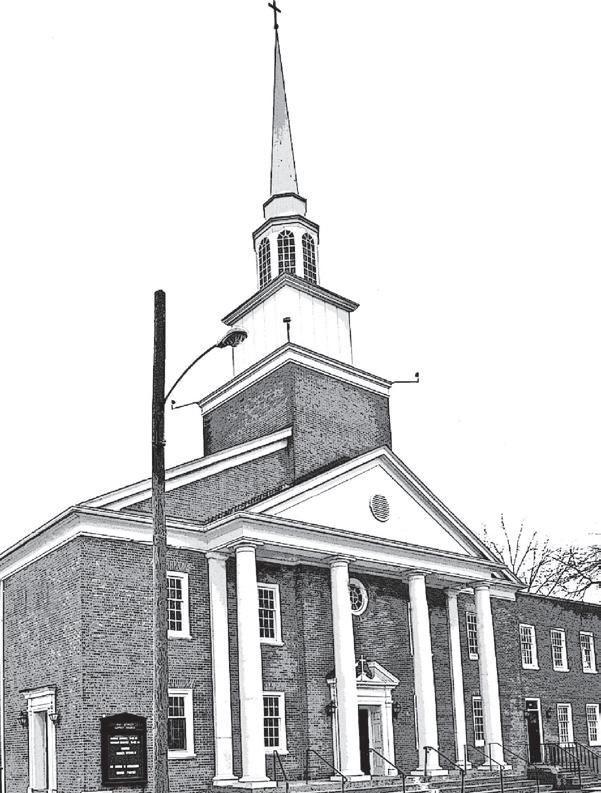





Street, 1505 Hull Street, and 1511 Hull Street. Ordinance No. 2024-325 To authorize the Chief Administrative Officer, for and on behalf of the City of Richmond, to accept funds in the total amount of $1,148,000.00 from the Virginia Department of Transportation and to amend Ord. No. 2024100, adopted May 13, 2024, which accepted a program of proposed Capital Improvement Projects for Fiscal Year 2024-2025 and the four fiscal years thereafter, adopted a Capital Budget for Fiscal Year 2024-2025, and determined a means of financing the same, by (i) establishing a new project for the Department of Public Works in the Transportation category called the “Richmond Signal System Smart City Traffic Signal Controllers” project and (ii) increasing estimated
FOR THE COUNTY OF HANOVER
FRANCISCO LUIS UNZUETA CARRENO, Plaintiff v. MARGARITA UNZUETA, Defendant. Case No.: CL24003767-00 ORDER OF PUBLICATION
The object of this suit is to obtain a divorce from the bond of matrimony from the defendant on the ground of living separate and apart without any cohabitation and without interruption for a period exceeding twelve months.
It is ORDERED that the defendant, who is a nonresident of Virginia, appear here on or before the 29th day of January, 2025 at 9:00 AM and protect his interests.
A Copy, Teste: FRANK D. HARGROVE, JR., Clerk I ask for this: Law Office of Dorothy M. Eure, P.C. Dorothy M. Eure, Plaintiff’s Attorney VSB# 27724 8460 Mount Eagle Road Ashland, VA 23005 (804) 798-9667 COMMONWEALTH OF VIRGINIA: IN THE CIRCUIT COURT OF THE COUNTY OF HENRICO WANDA EVANS DADZIECOLEMAN, Plaintiff, v. KOJO DADZIE ASMAH COLEMAN, Defendant. Case No.: CL24-6597 ORDER OF PUBLICATION
visitation; adoption consent; determination of religious affiliation; and responsibility for support. It is ORDERED that the defendants Shantoria Venable (Mother), & Unknown Father to appear at the above-named Court and protect his/her interest on or before 2/20/2025, at 9:40 A.M., COURTROOM #3
the defendant on the grounds that the parties have lived separate and apart without any cohabitation and without interruption, and with Plaintiffs intent to terminate the marriage, for a period exceeding twelve (12) months, namely since March 25, 2023. It appearing by affidavit that Plaintiff has no knowledge of the Defendant’s current address and Defendant’s present whereabouts are unknown and diligence has been used by or on behalf of the Plaintiff to ascertain in what county or city the Defendant is without effect.
It is accordingly ORDERED that Amando Oscar Gabriel Vazquez whose whereabouts unknown, appear before this court on or before February 10, 2025 at 9:00 a.m. And do what is necessary to protect his interests herein.
A Copy Teste:
HEIDI S. BARSHINGER, Clerk
The undersigned respectfully requests this: Elizabeth F. Egan, Esq. VSB #44849 Attorney for the Plaintiff America Law Group, Inc. 8501 Mayland Dr. Suite 106 Henrico, VA 23294 Phone: 804-885-0051 Fax: 434-885-3600 Email: legan@americalawgroup.com
VIRGINIA: IN THE CIRCUIT COURT FOR THE COUNTY OF HANOVER MELISSA OWEN, Plaintiff v. CHARLES OWEN, JR., Defendant. Case No.: CL24003766-00 ORDER OF PUBLICATION
The object of this suit is for the Plaintiff to obtain a divorce from the bond of matrimony from the defendant on the grounds that the parties have lived separate and apart without any cohabitation and without interruption, and with Plaintiffs intent to terminate the marriage, for a period exceeding twelve (12) months, namely since September 20, 2020. It appearing by affidavit that Plaintiff has no knowledge of the Defendant’s current address and Defendant’s present whereabouts are unknown and diligence has been used by or on behalf of the Plaintiff to ascertain in what county or city the Defendant is without effect. It is accordingly ORDERED that Kojo Dadzie Asmah Coleman whose whereabouts are unknown, appear before this court on or before February 3, 2025 at 9 a.m. And do what is necessary to protect his interests herein. A Copy Teste: HEIDI S. BARSHINGER, Clerk The undersigned respectfully requests this: Elizabeth F. Egan, Esq. VSB #44849 Attorney for the Plaintiff America Law Group, Inc. 8501 Mayland Dr. Suite 106 Henrico, VA 23294 Phone: 804-885-0051 Fax: 434-885-3600 Email: legan@americalawgroup.com CUSTODY
VIRGINIA: IN THE JUVENILE AND DOMESTIC RELATIONS DISTRICT COURT OF THE
VIRGINIA: IN THE JUVENILE AND DOMESTIC RELATIONS DISTRICT COURT OF THE CITY OF RICHMOND Commonwealth of Virginia, in re CLIFTON VENABLE, JR. & SHARIYAH VENABLE RDSS v. SHANTORIA VENABLE UNKNOWN FATHER Case No. JJ103821-09-00, JJ103821-11-00, JJ103822-10-00, JJ103822-12-00, ORDER OF PUBLICATION The object of this suit is to: Terminate the residual parental rights (“TPR”) of Shantoria Venable (Mother) & Unknown Father (Father) of Clifton Venable, Jr., child DOB 08/01/2020, and Shariya Venable, child, DOB 11/20/2016, child. “TPR” means all rights and responsibilities remaining with parent after transfer of legal custody or guardianship of the person, including but not limited to rights of: visitation; adoption consent; determination of religious affiliation; and responsibility for support. It is ORDERED that the defendants Shantoria Venable (Mother), & Unknown Father to appear at the above-named Court and protect his/her interest on or before 2/20/2025, at 9:40 A.M., COURTROOM #3
VIRGINIA: IN THE JUVENILE AND DOMESTIC RELATIONS DISTRICT COURT OF THE CITY OF RICHMOND Commonwealth of Virginia, in re DESZMEN VENABLE RDSS v. SHANTORIA VENABLE UNKNOWN FATHER Case No. JJ103827-10-00, JJ103827-12-00
ORDER OF PUBLICATION
The object of this suit is to: Terminate the residual parental rights {“TPR”) of Shantoria Venable (Mother) & Unknown Father (Father) of Deszmen Venable, child DOB 12/26/2023, child.
“TPR” means all rights and responsibilities remaining with parent after transfer of legal custody or guardianship of the person, including but not limited to rights of: visitation; adoption consent; determination of religious affiliation; and responsibility for support. It is ORDERED that the defendants Shantoria Venable (Mother), & Unknown Father to appear at the above-named Court and protect his/her interest on or before 2/20/2025, at 9:40 A.M., COURTROOM #3 PROPERTY
VIRGINIA: IN THE CIRCUIT COURT
and to quiet title to, that certain parcel of land in the County of Hanover, Virginia being 5.0 acres, more or less, located north of Verdi Lane, having the Hanover County Geographic Parcel Identification Number 8716-32-1010, and situated adjacent to, and sharing the said western boundary line with, that certain parcel of land being 7.7 acres, more or less, having the Hanover County Geographic Parcel Identification Number 871622-7192. And it appearing by Affidavit filed according to the law that the following defendants cannot be found: (i) the unknown heirs, devisees, creditors and successors in interest of Clifton Britton, deceased, made parties hereto by the general description of “Parties Unknown”, and (ii) Robert Cosby, a/k/a Robert Britton, George T. Adams, Herman L. Harris, and Owens Charity, if living, or their unknown heirs, devisees, creditors and successors in interest, if they be deceased, made parties hereto by the general description of “Parties Unknown”.
It is therefore ORDERED that the said named persons and others made defendants by the general description of “Parties Unknown”, if any there be, appear on or before the 17th day of January, 2025, at 9:00 a.m. in the Clerk’s Office of this Court and do what is necessary to protect/ his/her/their interest in said real estate. And, it is further ORDERED that this Order be published once a week for four (4) successive weeks in the Richmond Free Press, a newspaper of general circulation in the County of Hanover; and that a copy of this Order be posted at the front door of the Court House wherein this Court is held. Clerk, Circuit Court of Hanover County, Virginia
DATE: 11.22.24
I ask for this: George W. Gray, III (VSB# 87578) KERNS & KASTENBAUM, PLC 4900 Radford Avenue Richmond, VA 23230-3515
Telephone: (804) 355-2580
Facsimile: (804) 355-9297
Email: george@kemskast.com Counsel for Plainliffs
NOTICE VIRGINIA: IN THE CIRCUIT COURT OF THE COUNTY OF HANOVER RICARDO D. EDWARDS, TRUSTEE OF THE THE LORETTA C. EDWARDS LIVING TRUST DATED AUGUST 14, 2020 Plaintiff, v. PARTIES UNKNOWN The Unknown heirs, descendants, devisees, assigns, and/or successors in title to Robert E. Clarke, Sr. and George W. Clarke, if there be any, the consorts of any of the said unknown heirs who are married, the lien creditors of the said unknown heirs, if any, and other persons who may have an interest in the subject matter of this suit, whose names are unknown and are included in the general description of “UNKNOWN HEIRS and County of Hanover, Virginia., being originally owned by Robert E. Clarke, Sr. and George W. Clarke more particularly described as follows: ALL that certain lot, piece of real estate, with improvements thereon and appurtenances thereto belonging, containing 10.000 acres, lying and being in South Anna District,
PUBLIC HEARINGS ON COMMUNITY DEVELOPMENT NEEDS AND NOTICE OF FUNDING AVAILABILITY HENRICO COUNTY, VIRGINIA
The County of Henrico is preparing its Five-Year Consolidated Plan to guide the use of federal CDBG, HOME, and ESG funds.
Henrico County will conduct two public hearings to hear from the public concerning community development needs and past program performance:
● Monday, Jan. 13, 2025, 6:00 PM. Fairfield Area Library
● Wednesday, Jan. 29, 2025, 6:00 PM. Libbie Mill Library Applications for Funding for 2025-26 The funding application for CDBG, HOME, or ESG funds for Program Year 2025-26


or
Exp must
JBOSS, Ansible Automation, Linux Eng & Shell Scripting. Send resumes to Julie Gibson, Estes Express Lines, 1501 N. Hamilton St., Richmond, VA 23230.

the above-named Court and
therefore
The object of this suit is to obtain a divorce from the bond of matrimony from the defendant on the ground of living separate and apart without any cohabitation and without interruption for a period exceeding twelve months.
It is ORDERED that the defendant, who is a nonresident of Virginia, appear here on or before the 29th day of January, 2025 at 9:00 AM and protect his interests. A Copy, Teste: FRANK D. HARGROVE, JR., Clerk I ask for this: Law Office of Dorothy M. Eure, P.C. Dorothy M. Eure, Plaintiff’s Attorney VSB# 27724 8460 Mount Eagle Road Ashland, VA 23005 (804) 798-9667 VIRGINIA: IN THE CIRCUIT COURT

